Can I travel to Australia with a criminal record?

Yes , it is possible to travel to Australia with a criminal record . However, you need to apply for a visa and provide additional documents.
This article provides all the information you need to know about travelling to Australia with a criminal record.

Can I apply for an Australian visa with a criminal record?
Yes , travellers with a criminal record may apply for the Australian ETA or an eVisitor Visa .
A person convicted of a minor offence , who has not been sentenced to prison, can complete the ETA or eVisitor application form.
A traveller with a substantial criminal record , may not apply for the ETA for Australia or the eVisitor visa.
Those who are eligible to apply for the Australian electronic permit must answer the application truthfully.
If a person has had a conviction and answers yes to any of the security questions, they will automatically not be able to continue with the ETA application process.
What is a substantial criminal record?
For the purpose of the character test for the Australian visa application , a substantial criminal record is if the individual has been sentenced to a total of 12 months or more in prison.
Why can I not apply for an Australian visa with a substantial criminal record?
The Australian ETA or eVisitor application has two sections that involve criminal conviction questions: the character detail questions and the declaration section.
Applicants must answer all questions accurately and with absolute honesty. Therefore, if a traveller has been charged with an offence and is awaiting legal action, they are likely to have their ETA or eVisitor denied.
Character detail questions on the visa application
On the application form, a traveller must answer yes or no to the following questions:
- Have you ever been charged with any offence that is currently awaiting legal action? If yes, please provide details of each charge.
- Have you ever been convicted of an offence in any country (including any conviction which is now removed from official records)?
If yes, please provide details of each offence and the penalties imposed.
An applicant with a serious criminal conviction will fail the character details section of the application.
Through a visa application, travellers will have to provide further information so that Australian authorities can verify their character .
Declaration on the application
When completing the online application for the Electronic Travel Authority for Australia, applicants must declare the following:
- I don’t have a criminal record of 12 months jail time (served or not served).
- I have never been charged or convicted of a family or domestic violence offence or any similar related offence.
- I have never been the subject of a domestic or family violence order , or any other order, of a tribunal or court or other similar authority, for the personal protection of another person.
If an applicant cannot declare the statements above, they are also not eligible for the ETA or eVisitor visa.
However, this does not mean that they cannot get a visa for Australia. Having a serious criminal conviction only means that the traveller is not eligible to apply for the Australian ETA or eVisitor visa.
Applying for an Australian visa with a criminal conviction
It is possible to get an Australian visa with a criminal conviction. Australia offers a variety of visas depending on the needs of the traveller.
However, when applying for most Australian visas, applicants must declare all criminal convictions . Secondly, foreigners who apply for any Australian visa must meet:
- Health requirements
- Character requirements
Australia does not grant a visa to individuals if there’s a risk that they might:
- Engage in criminal conduct
- Harass, molest, intimidate or stalk another person
- Be a danger to the Australian community
- Incite discord in the Australian community
- Vilify a segment of the Australian community
What is considered a criminal conviction when applying for an Australian visa?
A person who has been found guilty of a crime in a court of law is considered to have a criminal conviction.
Australian immigration authorities take such criminal convictions into account when processing visa applications.
What criminal convictions should I declare?
Any criminal conviction , no matter how insignificant, must be declared when applying for an Australian visa.
It does not matter how long ago the conviction was or how minor—: Australian visa applicants must declare all criminal convictions .
If a person fails to declare a criminal conviction, entry to Australia may be denied.
Will a criminal record prevent me from travelling to Australia?
A criminal conviction doesn’t necessarily mean you cannot travel to Australia. Nevertheless, whether you can enter the country or not will depend on Australian immigration authorities.
A person with a substantial criminal record may have issues obtaining a visa to enter Australia.
Offences that happened over 10 years ago with a 12-month (or more) custodial sentence do not appear on local police searches. However, they are relevant on Australian visa applications.
Australian authorities will look at various factors when processing an application.
Are traffic offences criminal convictions?
Yes, a traffic offence is a criminal conviction . However, if a traveller’s only conviction is a traffic offence, they will likely obtain a visa to visit Australia.
Character requirements on the Australian visa application
When applying for an Australian visa, an essential aspect is meeting Australia’s character requirements .
Applicants must be of good character to visit or live in Australia.
A traveller may not pass the character requirements in some circumstances. These include if:
- They have a substantial criminal record
- They have been convicted of escaping from immigration detention
- They are or have been a member of an organisation that the Minister suspects of being involved in criminal conduct
- The Minister suspects the applicant to be involved in smuggling, people trafficking, genocide, a war crime, a crime against humanity, a crime involving torture or slavery, or a crime of international concern, whether they have been convicted or not.
- The applicant’s past and present criminal or general conduct shows they are not of good character.
- They have been convicted, found guilty, or had a charge proven for one or more sexually based offences involving a child.
- They are subject to an adverse security assessment by the Australian Security Intelligence Organisation.
- They are subject to an Interpol notice, from which it is reasonable to assume that they are a direct or indirect risk to the Australian public.
- They are or have been convicted of domestic violence.
Documents to support good character
After applying for a visa, the applicant may be asked to provide the following:
- A police certificate
- A completed Form 80 Personal particulars for character assessment
- A statutory character declaration
- A military certificate
- A letter of good conduct from an employer
Australian authorities evaluate applications on a case-by-case basis. The documents they request will depend on the applicant’s specific circumstances.
Related News

Australia digital nomad visa options for remote work

Australia Incoming Passenger Card & Customs Declaration Form
Can I Apply for an Australian Visa if I Have a Criminal Record?

By Kaku Caro Lawyer
Updated on March 26, 2024 Reading time: 5 minutes
This article meets our strict editorial principles. Our lawyers, experienced writers and legally trained editorial team put every effort into ensuring the information published on our website is accurate. We encourage you to seek independent legal advice. Learn more .
What is a Criminal Record?
What is the character test, when might i fail the character test, what constitutes a substantial criminal record.
- What Constitutes a Person that is ‘Not of Good Character’?
I Need to Apply for a Visa, But I Have a Criminal Record. What Do I Do?
My visa was refused or cancelled on character grounds. what should i do, key takeaways.
Migrating to Australia can be complicated, and applying for a visa is occasionally stressful and time-consuming. On top of this, if you have made mistakes in the past, you can experience more uncertainty and confusion regarding what you should do. You may wonder what constitutes a criminal record and if you should disclose this during your visa application process. This article will define key terms and explain the rules around visas and criminal records. It will also set out the next steps to help you achieve your immigration goals.
First, it is important to define some terms that you might come across. These include:
- criminal offence;
- criminal conviction; and
- criminal record.
Generally speaking, if you break the law, you can be charged with a criminal offence and taken to court. If the court finds you guilty, this means you may have a criminal conviction. This can then appear on your criminal record.
In special circumstances, the court might find you guilty, but will not enter a criminal conviction in your criminal record. Additionally, you might have a previous criminal conviction that no longer appears in your criminal record, known as a ‘spent conviction’. It is important to understand these different terms to know if you have a criminal record.
For the purposes of Australian immigration law, the character test is the key factor to consider.
Suppose you wish to successfully apply for a visa to visit, work or move permanently to Australia. In that case, you will need to show the Department of Home Affairs (DHA) that you are a person of good character and that you pass the character test. Passing the character test is important:
- when you are applying for an Australian visa; and
- while you hold an Australian visa.
If you fail the character test or if the Minister or their delegate reasonably suspects you will fail it, they can:
- reject your visa request; or
- cancel your existing visa.
Sometimes, the Minister may be required to cancel your visa. For example, this can happen if you are serving a full-time prison sentence in Australia for specific offences.
Criteria for whether you pass or fail the character test can be found in legislation. For example, you will not pass the character test if you:
- have a substantial criminal record;
- committed an offence concerning your time in immigration detention;
- are associated with an organisation that was or is involved in criminal conduct;
- have been involved in serious crimes such as trafficking, genocide, crimes against humanity, war crimes, torture, slavery or any other crime that is of serious international concern;
- are at risk of engaging in criminal conduct or harassing, molesting, intimidating or stalking people in Australia;
- have been convicted or found guilty of a sexual-based offence involving a child;
- represent a danger or risk to any group of the Australian community;
- are deemed to be a person that is ‘not of good character’; or
- have been found by organisations such as ASIO and Interpol to be a risk to the Australian or international community.
You have a substantial criminal record if you have been sentenced to:
- imprisonment for life; or
- imprisonment for a term of 12 months or more.
There are set rules regarding counting a sentence period to determine if it reaches the threshold of 12 months or more.
Additionally, you will also have a substantial criminal record if a court acquits you of an offence on the grounds of insanity or finds that you are not fit to plead, and you are detained in an institution as a result.
Example:
John is serving two terms of six months imprisonment for two offences. The court sentenced him to serve these two offences concurrently (at the same time). Unfortunately for John, for the purposes of the character test, the total of those two terms is 12 months. This means he would fail the character test, and the DHA would refuse or cancel the visa.
What Constitutes a Person that is ‘Not of Good Character’?
As seen in previous court cases, the DHA will take into account any past or present criminal and general conduct when determining if you are ‘not of good character’.
Therefore, even if you do not have a substantial criminal record, other minor criminal records and general bad conduct may be taken into account as a way of achieving a holistic picture of your character.
If you are thinking of applying for a visa and you have any prior criminal offences, court appearances or uncertainty about any past convictions, you should consider whether these offences will fall under the substantial criminal record criteria. Specifically, consider the 12-month sentence threshold.
If you do not have a substantial criminal record, you may still pass the character test. If your record meets the requirements to be substantial, it is highly likely that your visa will be refused on character grounds. However, in the event that you do have any criminal offences, it is best to contact an immigration lawyer or migration agent. They will consider what the DHA’s position would be regarding your:
- likelihood of re-offending;
- considerations that will aggravate or mitigate your situation;
- the impact of a visa refusal or cancellation on your family or businesses in Australia; and
- the strength, nature and duration of your ties to Australia, among other considerations.
You should always be truthful and forthcoming in your visa application. This means that you should be honest regardless of how small you think the past offence has been.
You should disclose any ‘spent convictions’ or other criminal convictions, even if these have been cleared from your criminal record. This is very important, as not being truthful and not disclosing information can have serious consequences.
In most visa applications, you need to answer the following question: “Has any applicant ever been convicted of an offence in any country (including any conviction which is now removed from official records)?”. Therefore, we suggest disclosing all prior criminal convictions, even if these are ‘spent convictions’. Not doing so might trigger the Public Interest Criteria 4020.

Sponsoring overseas workers as an Australian business is complicated. Let us simplify it for you with this free employer guide.
Suppose your visa application has been refused or cancelled by the DHA due to not passing the character test. In that case, you may apply to the Administrative Appeals Tribunal (AAT) to have the decision reviewed, provided you have a right of review. Your decision letter will explain whether the AAT can review your decision. If the AAT cannot review the decision, your other option could be to appeal to the Federal Court of Australia. For mandatory cancellations, your lawyer or agent can also assist in revoking the cancellation. However, you must do this within 28 days.
You can apply for an Australian visa if you have a criminal record. The key factor is to look into your criminal record to ensure that you pass the character test. This involves determining if you have a substantial criminal record. If you have any criminal offences or a criminal record, it would be best to contact an experienced immigration lawyer or migration agent to assist you.If you need help with your Australian visa, our experienced immigration lawyers can assist as part of our LegalVision membership. For a low monthly fee, you will have unlimited access to lawyers to answer your questions and draft and review your documents. Call us today on 1300 544 755 or visit our membership page .
We appreciate your feedback – your submission has been successfully received.
Register for our free webinars
Ai in business: mastering compliance and mitigating risks, preventing sexual and gender-based harassment: your whs legal duties, protecting your retail business: understanding your legal obligations, demystifying startup funding: strategies for growth, contact us now.
Fill out the form and we will contact you within one business day
Related articles

How to Avoid a Partner Visa Application Refusal

6 Steps to Take if You Want the AAT to Review Your Visa Application

What is Public Interest Criteria 4020?

How Can I Make Myself Eligible for the 189 or 190 Visa?
We’re an award-winning law firm

2023 Fast Firms - Australasian Lawyer

2022 Law Firm of the Year - Australasian Law Awards

2021 Law Firm of the Year - Australasian Law Awards

2020 Excellence in Technology & Innovation Finalist - Australasian Law Awards

2020 Employer of Choice Winner - Australasian Lawyer
Choose your preferred currency

Australian and New Zealand visas: Expert advice and assistance
Visiting Australia with a Criminal Record: Short Stay
Information about visiting australia with a criminal record: short stay and how to apply, if you are planning on visiting australia with a criminal record, you will require an application that allows you to disclose the offence and sentence. you cannot use the normal electronic application process. depending on the nature of your convictions, you may still be able to visit australia, despite your criminal record..
Registration Fee
£ 130.00

- Visa Description
Visa Details
Can you go to australia with a criminal record.
If you are planning on visiting Australia with a criminal record , you must note that Australia has very strict rules regarding visas for individuals with prior criminal convictions. So it’s quite appropriate to ask: Can I travel to Australia with a criminal record ? The nature of the crime, and the sentence served together with your change of lifestyle and rehabilitation, all play a part in determining whether or not you are granted a visa.
Australia ETA: Criminal Convictions (eVisitor Visa)
Individuals who wish to travel to Australia – with a criminal record – will not be able to apply for an Australia ETA (eVisitor) visa, which completed online. If you have criminal convictions, with a prison sentence totalling 12 months or more (whether served or suspended), you will fail the character requirements you cannot apply for an ETA visa for Australia. It does not mean that you cannot get a visa, but you will have to supply further information to enable authorities to verify your character.
We have extensive experience in this area, and can provide you with expert advice and assistance to give you the best possible chance of securing your Australian visa, despite your criminal convictions.
Declaring criminal convictions, what criminal convictions do i have to declare.
Any criminal convictions must be declared when applying for an Australian visa, however minor, and regardless of how long ago they were incurred. A minor offence will not prevent you getting a visa. Lying about it, on the other hand, could well result in you being refused a visa. Failure to declare a criminal conviction, even a minor one, could mean that you are denied entry, even if you do have a visa. It is extremely important that you are truthful about criminal convictions .
How to apply for an Australian visitor visa when you have a criminal record
The difference is in how the applications are processed. Most visa applications are processed and issued electronically (ETA or eVisotor visa). However, if you have criminal convictions with a custodial sentence, (irrespective of the country you are from), you cannot apply for an ETA visa using the standard on-line system . When an applicant has criminal convictions, they are usually allocated to an Australian Immigration case officer. The case officer will decide how the application is processed, and what is required for the visa application.
Registering your request to apply for an Australian Visa, when you have criminal convictions
To start the application process, you must first register your request on-line, at which time you pay our professional fee, as above.
Additional Fees:
- You will have to pay an Australian Government application fee for processing the application.
- If the application goes for further character assessment, you will have to pay a further fee
- Additional fees that may apply are for a police clearance certificate .
- There will be additional fees (payable directly to the agencies involved) if any documentation requires verification
Additional requirements when applying for you visa
Being able to support yourself financially during your stay in Australia
Supporting individuals with Criminal Convictions through the Australian Visa Application process
Our team have years of experience in dealing with Australian Visa Applications for individuals with convictions. After accepting your application, a named member of our team will contact you to help you through the process. Because of our experience in processing these applications, we have a good idea of what a case officer will be looking for. Once we understand your circumstances, we can advise you on the information that you need to prepare and present to Australian Immigration. This is what your representative will do:
- Your representative will assess your circumstances and prepare a checklist of suitable information to support your application
- They will check through the supporting information that you provide and advise on any changes that may be required
- Your representative will assist with the preparation the presentation for Australian Immigration
After the application is lodged with Australian Immigration, your case will be assigned to an Australian Immigration case officer who has delegated powers to make a decision on an application.
- Your representative will inform you of an any queries that occur. They will advise and assist with a suitable response
- They will present the reply to the case officer.
Australian Immigration may refuse the visa application and there is generally no appeal process. But, unless the case officer puts in place an exclusion notification, you can apply again.
How long will it take to get a visa if you have criminal convictions?
When criminal convictions are involved it typically takes at least 3 months, but it could be up to 12 months, to obtain a decision on a visa dependent on the severity of the sentence and the exact pathway that is deemed suitable for the application by the Australian immigration case officer assigned to your application.
The time it takes to process your visa application will depend on the nature and severity of the offence(s), and the length of sentence . When we have more information on your specific circumstances, we should be able to provide you with an estimate.
Things to note about your passport:
- On the day that you enter Australia, you must have at least 6 months remaining on your passport before it expires
- The visa is linked to the passport that you use in your application. This means that, if you renew or replace your passport (for whatever reason), you will have to re-apply for a visa.
Conditions of your visa, once granted:
Depending on your personal circumstances and the reason for your visit, a grant can be issued for a single visit with the time allowed for the trip restricted to less than the normal 90 days.
Otherwise, the normal conditions are:
- Your visa will normally be valid for 12 months from the day it is granted.
- During this time you are normally allowed to visit Australia multiple times, but will be allowed to stay no more than 90 days on each visit.
- You are not allowed payment for work carried out in Australia
Visiting Australia with a criminal record: Frequently Asked Questions
Can i apply for an eta visa for australia if i have a criminal record.
If you have criminal convictions that incurred a prison sentence (suspended or served) totalling more than 12 months, you will NOT be able to apply online for an ETA (eVisitor) visa for Australia
When applying for an Australian Visa, what is a criminal conviction?
Where a crime has been committed and the culprit has been found guilty in a court of law.
Can you travel to Australia with a criminal record?
Yes, provided you have applied appropriately and have been granted an entry visa. However, a visa will only be granted if
- you follow the correct procedure
- you declare your criminal convictions
- the nature of the crimes have been convicted of does not preclude your entry into Australia (see below)
Any criminal convictions must be declared when applying for an Australian visa, however minor and regardless of how long ago they were incurred. Failure to do so, could mean that you are denied entry, even if you do have a visa.
What criminal convictions prevent travel to Australia?
If you have a substantial criminal record , it is possible that you will be refused entry into Australia. A substantial criminal record will make the application process more complex and will take longer for a decision.
Offences which occurred over 10 years ago with a 12-month (or more) custodial sentence, no longer count on local police searches. However, they are still relevant to Australian entry visa applications .
The period since the offence : When making an application to travel to Australia, the period without re-offending is taken into account, together with your current lifestyle.
Suspended sentence: It is the length of the sentence – whether suspended or not – rather than the time served, that is taken into account, along with the nature of the crime.
Is a traffic offence a criminal conviction?
Yes. However, if this is your only offence, it will not restrict your ability to obtain a visa.
Can I go to Australia with a drink driving conviction?
Yes. If this is your only offence, it should not restrict your ability to obtain a visa
Do you have to declare a drink driving conviction for an Australian visa?
It depends on the circumstances and the nature of the sentence
Can I get an Australian visa with police caution?
Yes, a police caution is not the same as a conviction
It typically takes at least 3 months from the time that all the requested information has been supplied. It could take as long as 12 months
The time it takes to process your visa application will depend on the nature and severity of the offence(s), and the length of sentence . When we have more information on your specific circumstances, we should be able to provide you with an estimate.
Ready to start your visa application?
Do you need assistance in selecting the right visa for you?
Request a consultation.
Complete your details here to request a Telephone Consultation
- Name * First Last
- Phone * The full international telephone number where we can contact you
- When would be a convenient time to contact you? *
- Details about your enquiry *
- Consent * The information that we collect will be used exclusively for the purposes of dealing with your enquiry. Read the full Privacy Policy I agree to the privacy policy.
- Email This field is for validation purposes and should be left unchanged.
Share this:
Can You Travel Overseas with a Criminal Record in Australia?
- February 5, 2024
For many Australians, international travel is a rite of passage. However, the journey can be uncertain for those with a criminal record.
Countries have varied entry regulations, and a criminal past can complicate matters. In this article, let’s discuss how a criminal record might impact an Australian’s travel rights overseas.
Does A Criminal Record Impact Travel Rights From Australia?
Yes, a criminal record can affect an Australian’s travel abroad. Entry policies of the destination country determine the impact.
Some nations require criminal background statements, while others restrict visas or entrance to those with specified crimes.
Australians with criminal backgrounds should investigate their destination’s entrance criteria and consult an immigration specialist before travelling.
Which Countries Restrict Entry For Australians With A Criminal Record?
Many countries have entry restrictions or additional requirements for travelers with a criminal record, and Australians are no exception.
Here are some countries that have been known to restrict entry or require additional documentation for individuals with a criminal background:
- United States: The U.S. can deny entry to those with various convictions, from moral turpitude crimes to drug offences. If they have a record, Australians might need to apply for a visa rather than using the Visa Waiver Program.
- Canada: Canada is known for its strict entry requirements regarding criminal records. Even minor offences like DUIs can result in a traveller being denied entry.
- United Kingdom: While more relaxed than the U.S. or Canada, the UK can only allow entry based on unspent convictions, especially if they deem the traveller a threat.
- China: China may deny visas or entry to individuals with certain criminal convictions.
- Japan: Japan has restrictions on entry for those with drug-related convictions.
- New Zealand: While generally lenient with Australians, New Zealand can refuse entry to those with certain serious offences.
- United Arab Emirates: Past convictions, especially drug-related, can lead to denial of entry or transit.
It’s crucial to understand that entry is often at the discretion of the border control officials, and regulations can change.
Additionally, many countries will base their decision on the nature and recency of the conviction, its relation to the country’s laws, and any perceived threat to public safety.
Need a Lawyer?
What is the australian character requirement for visas.
Visa applicants in Australia must meet the Character Requirement to ensure community safety. Key points include:
- Legal Basis: Defined in Section 501 of the Migration Act 1958 and enforced by the Department of Home Affairs.
- Police Checks: Visa applicants often need police clearances from countries they’ve resided in for the past 10 years.
- Criteria: Refusal can stem from a substantial criminal record, association with criminal activities, risk assessments, past behaviour, and other specific grounds.
- Exceptions: Some may still receive a visa despite failing the test based on discretion, while others face mandatory cancellation.
Our criminal lawyers are ready to advise you regarding these concerns.
How To Check Your Criminal Record Before Traveling?
Checking your criminal record in Australia before travelling can give you insight into potential travel barriers. Here’s a step-by-step guide on how to check your criminal record:
- Determine the Type of Check:
- National Police Check (NPC): This is the most common check for Australians. It provides a summary of an individual’s police history in Australia.
- Working With Children Check: While not for travel purposes, this is another form of background check in Australia that focuses on convictions endangering children.
- Contact Your State’s Police Service: Each state and territory in Australia has its police service that can process a National Police Check.
- Complete an Application:
- Most police services offer online and paper application forms for the National Police Check.
- You’ll need to provide personal details, a list of all your addresses over the past five years, and the purpose of the check (e.g., “overseas travel”).
- Provide Identification: You must present original identification documents (and sometimes certified copies) to prove your identity. These may include a birth certificate, passport, driver’s license, etc.
- Pay the Fee: A fee is typically associated with obtaining a police check. The exact amount may vary between states and territories.
- Receive Your Results: Once you’ve submitted your application and it’s been processed, you will receive a report detailing any criminal history. This usually arrives within a few days to several weeks, depending on the processing time of the specific police service.
- Consider the ‘Spent Convictions’ Scheme: Australia has a spent convictions scheme where some criminal convictions can become ‘spent’ after a set period, meaning they won’t appear on your police check. The rules for this scheme vary between states and territories.
It’s a good practice to keep a copy of your police check when travelling, especially if you know the destination country has strict entry requirements related to criminal records.
Also read: Can You Go On Holiday On Bail in Australia?
How To Apply For A Visa With A Criminal Record?
Applying for a visa with a criminal record can be a more complex process than a standard visa application, as the presence of a criminal record might influence the decision of the host country’s immigration authority. Here’s a general guideline on how to approach it:
Research the Destination Country’s Policies: Every country has different regulations and standards for admitting individuals with a criminal record. Familiarize yourself with these standards and understand the potential barriers.
Obtain Your Criminal Record: Obtain a copy of your criminal record before applying. This might be required during the application process, and knowing exactly what’s on it is good.
In Australia, you can get a National Police Check, which summarizes your police history.
Consult an Immigration Lawyer or Expert: Given the complexities, it’s wise to seek counsel from an immigration lawyer or consultant who can guide you through the application process, especially if you’re aiming for a country known for its stringent entry requirements.
Complete the Visa Application: Fill out the visa application form diligently.
Be honest: Provide accurate information if the application asks about your criminal history. False declarations can lead to immediate denials and future travel bans.
Detailed Explanation: Some countries might offer a space to explain any convictions. Use this to explain the circumstances, any rehabilitation, and why you’re not a risk.
Attach Relevant Documentation: Along with your criminal record, you might need to include character references, records of rehabilitation, or any other documents that demonstrate you’re of good character now despite your past.
Be Prepared for Additional Interviews or Scrutiny: Some countries may require a personal interview or additional background checks if you’ve declared a criminal record.
Wait for a Decision: The visa application will be reviewed once submitted. Given the complexities of a criminal record, this might take longer than usual.
Consider ‘Waivers of Ineligibility’ if Denied: Some countries, like the U.S., offer waivers for individuals deemed ineligible due to criminal convictions. While securing a waiver can be a long process, it’s a potential pathway to getting the visa approved.
Remember, the key is transparency and honesty. While a criminal record can pose challenges, many individuals with past convictions successfully obtain visas annually by adhering to the proper channels and showcasing their rehabilitation and current character.
Understanding The ‘Spent Convictions’ Scheme In Australia
The ‘Spent Convictions’ scheme in Australia allows certain criminal convictions to be effectively “forgotten” after a set period of good behaviour. Here’s what you need to know:
- Qualifying Period: Typically, after 10 years for adults and 5 years for juveniles, a conviction can become spent, provided there are no further convictions.
- Not Listed: Once a conviction is spent, it’s no longer listed on a police check, which means it’s not disclosed for most purposes.
- Exclusions: Not all convictions, especially very serious crimes or sentences over a certain length, can be spent.
The scheme aims to help people overcome mistakes, ensuring minor past convictions don’t affect their future indefinitely. Speak to our criminal lawyers about this today.
Can You Get a Passport With a Criminal Record Australia?
Having a criminal record doesn’t directly prevent you from getting a passport, but it can significantly complicate the process. The ability to travel overseas with a criminal record depends on several factors, including:
Type of offense: Serious offenses like violence, drug trafficking, or terrorism are more likely to cause problems than minor traffic violations. Length of time since the offense: Older convictions are generally less concerning than recent ones. Sentence served: Completion of any sentence and evidence of rehabilitation can improve your chances. Destination country: Different countries have different rules about entry for people with criminal records.
Here’s how your criminal record can affect your passport application in Australia:
- Reportable Offenders: If you’re considered a “reportable offender” under the Australian National Child Offender Register (ANCOR), you need permission to leave the country from a relevant authority before applying for a passport. Without this permission, your application will be withdrawn.
- Character Assessment: Even if not a reportable offender, the Department of Foreign Affairs and Trade (DFAT) can still assess your character based on your criminal record. If they deem you a risk to national security or the international community, they can refuse your passport application.
- Visa Applications: Obtaining visas for travel can be further complicated with a criminal record. Each country has its own policies, and some may automatically deny entry to anyone with certain convictions.
Can You Travel Overseas With A Criminal Record Australia?
Navigating overseas travel with a criminal record can be tricky. At Walker Pender, we offer expert guidance tailored to your unique circumstances. Unlock the world without the uncertainty – contact us today and ensure a smoother journey ahead.
Reach out to Walker Pender now and let your adventure begin!
Hayder Shkara

Drink Driving QLD: Limits, Criminal Convictions, and Their Impact

Can You Go On Holiday On Bail in Australia?

Arson in Australia: 8 Things You Need to Know
Do you have a case.
Get your free case review within 24 hours. All Fields Required.
Ipswich Office 28 Nicholas Street, Ipswich 4305 Phone: (07) 3813 7833 Opening Hours: Mon-Fri 8:30am- 5pm
Springfield Office Orion Shopping Centre, Springfield QLD 4300 Phone: (07) 3470 1400 Opening Hours: Mon-Fri 8am- 5pm
Sydney Office 202/255 Castlereagh St. Sydney NSW 2000 Phone: 02 8089 3148 Opening Hours: Mon-Fri 8am- 5pm
Copyright Walker Pender Group © 2023. All Rights Reserved.Liability limited by a scheme approved under professional standards legislation (Personal Injury work exempted).
Contact Us Today!
Call 000 if you need urgent help

National Police Checks
Apply for a national police certificate.
Gather and scan your identity documents. Get fingerprints if needed.
Apply online or by post. Pay by card, or by bank cheque or money order if applying by post.
Most digital certificates arrive in your inbox within a few days if you apply online, although some take longer. Fingerprint checks take at least 15 working days.
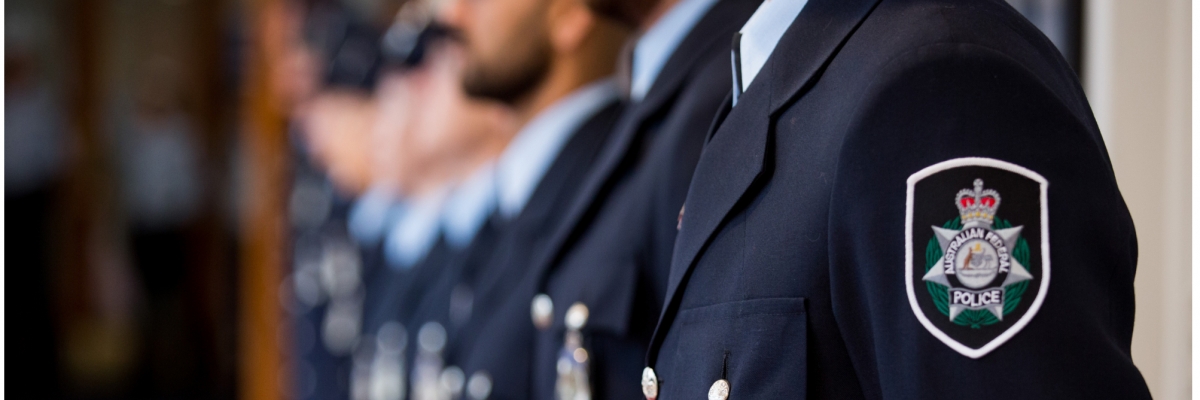
Before you apply
How to apply, after you apply.
A National Police Certificate (NPC) is a summary of your offender history in Australia. It's sometimes called a national police check.
You must use the AFP if your request is for Commonwealth or ACT reasons.
You might need a national police check for things such as:
- recruitment and job applications
- volunteer and not-for-profit positions
- working with children or vulnerable groups
- licensing or registration scheme applications
- work-related checks due to legislation or regulations
- Australian citizenship and permanent residence applications
- visa applications for some countries
- working overseas.
You will need to state the purpose of the police check on your application. Different purposes might lead to different results, depending on relevant laws.
Anyone can apply for an NPC for their own use. But you cannot apply for an NPC for someone else without their consent.
If you're younger than 18, you'll need a parent or guardian to co-sign your application. If you cannot do this, contact us.
What is included in a police check
We compare your details, such as name and date of birth, against a central index. We then work out what information to include, subject to laws and current policies.
Your NPC will list 'disclosable court outcomes' released in line with federal, state and territory laws, including the Crimes Act 1914 (Cth) and the Spent Convictions Act 2000 (ACT).
Our national police check also uses information from all Australian police services to list any:
- local and interstate criminal and traffic court outcomes
- outstanding warrants
- pending charges, where you have been charged with an offence but have not yet been to court.
Depending on the relevant state or territory legislation, it may not include:
- convictions considered 'spent' under federal or state legislation
- guilty findings without conviction.
Some categories of employment or purposes of the check are exempt from any relevant legislation.
We cannot tell you in advance what may or may not be on your NPC. You'll need to check with the criminal records section of the relevant state or territory police service.
Fees and charges
Each NPC application costs $47. If you need to supply fingerprints as part of your application, the total cost is $104.
Application fees are exempt from GST.
Company checks
If you need us to do an NPC on an Australian company, visit Company checks .
We use the identity documents you send us to verify your identity. You need to send us identity documents worth at least 100 points in total.
Download the proof of identity checklist:
If you can't meet 100 points, contact us.
You'll need to scan or photocopy your documents to attach to your application.
You'll also need to send us details of other names by which you are, or have been, known.
Fingerprint checks
Sometimes, you’ll need to have a fingerprint check as part of your NPC.
For example:
- security guard licensing
- visa applications through a migration agent in some countries.
If you live in the ACT, book an appointment by emailing [email protected] . Make sure you include:
- your full name
- contact phone number (mobile preferred)
- location preference: City Police Station or Woden Police Station.
Post the original of your fingerprints to us with your completed application. You ‘ll also need to send an official translation if they are in a language other than English.
You can’t use an online application if you need to include fingerprint checks. You’ll have to apply by post.
We’ll check your fingerprints against a central database of records. This takes between 15 and 30 business days.
If your NPC does not include a fingerprint check, you can
Apply online
- Scan and upload your documents.
- Check your date of birth and other details are correct.
- Include your email address.
- Pay $47 by credit card.
We will start processing your application straight away and send you a payment receipt via email. We will send a digital certificate when we have completed the check.
You can also ask for a hard copy of your certificate. We will post that to you.
If you prefer to apply by post, or if you need to include a fingerprint check, print a National Police Check application form [PDF 800KB] .
When completing the form, remember:
- use black ink
- mark boxes with a cross (X)
- use capital letters
- check all details are correct
- sign and date the form.
You will need to pay in Australian dollars via bank cheque or money order, made out to the Australian Federal Police.
Make sure you include all paperwork, forms, payment and identification with your application. If you need a fingerprint check, include the original of your fingerprints.
You must send us the form no more than 3 months after you sign it.
If you do not fill in your application correctly, and include payment and documents, we will not process it.
Australian Federal Police Criminal Records Locked Bag 8550 CANBERRA CITY ACT 2601
You cannot lodge your application at a police station.
Mistakes in your application
Contact us straight away if you:
- make a mistake in your submitted application
- forget to include some details.
It is up to you to make sure that the check is suitable for the purpose you need it for. Once you have submitted your application, you cannot get a refund.
Do not lodge a new or updated application unless we tell you to.
False or misleading information
You will need to certify that the personal information on your application is correct.
If we discover that you have given us false or misleading information, you may be prosecuted under the Criminal Code Act 1995 (Cth) .
Processing times
We complete and post most NPCs within 48 hours of receiving your application.
This may vary if we need to get information from multiple states or territories.
Digital certificates are sent directly to your email address.
For hard-copy certificates, allow for postage time. Wait at least 15 business days before contacting us about the status of your check.
Name and fingerprint NPCs may take 15 to 30 business days.
We will send you an email to let you know when we have:
- received your application
- finalised your application and mailed your certificate.
Check the status of your NPC
You can also validate any newly completed checks.
Change of address
If you change your address before we notify you that your certificate has been posted, please tell us. Otherwise, you can contact Australia Post to redirect your mail .
Receive your certificate
We will send your:
- digital certificate as a secure PDF to the email on your application
- hard copies to the name and postal address on your application.
Both digital and hard copy certificates have security features.
Digital certificates include a unique QR code you can scan to validate your certificate.
We print hard-copy certificates on paper that includes:
- a watermark of multiple images of a padlock with 2 keys visible when held up to the light
- fluorescent tricolour threads on both sides of the document that glow blue, yellow and red when held under ultraviolet light
- a border on the right-hand front of the document, printed in microtype, that can be read when viewed under magnification
- images printed in heat-sensitive ink that fade or disappear under moderate heat or friction
- hidden images printed in fluorescent ink that glow yellow when viewed under ultraviolet light
- a screened background printed in solvent-reactive ink.
See an example hard-copy certificate [PDF 639KB] .
Do not rely solely on a photocopied or scanned and emailed certificate. Always ask for an original when you need information to make a decision.
If you receive a certificate that appears to have been tampered with, please tell us straight away.
Check the details
When you receive your digital or hard copy certificate, check all your personal details.
If your name or date of birth is wrong, please tell us straight away.
Where the error was due to incorrect details you entered, you'll need to submit and pay for a new, correct application.
If we caused the error, we'll process a new application at our expense.
Disputed records
If you believe any court outcomes on your certificate are incorrect or inaccurate, complete a Disputed Record form .
Attach any extra information or documents supporting your enquiry, such as identification or court documents, to the form to help us assess your application.
We might need comparison fingerprints to resolve some disputes. We will let you know if this is the case.
Validity of your certificate
Your certificate is valid from the date of your application, but it won't record any court outcomes that occur after that date.
It's up to the organisation asking for the certificate as to how long they will accept it.
Lost certificate
If you lose your certificate, you can download another from the digital portal for up to 3 months.
If you need a new hard-copy certificate, you will need to contact us. We will issue reprints for 3 months from the original date. If more time has passed, you will need to submit a new application.
Using your certificate
The level of information we release is based on the purpose of the check. This means you can only use your certificate for that purpose.
For example, a certificate issued for the purpose of 'Aged Care staff/volunteers' is not appropriate for a job needing a certificate for 'Immigration Detention Centre Employment'.
You may, however, use the certificate more than once for the same purpose.
Criminal record for court
Your NPC is not suitable for use as a criminal record in court proceedings. It only lists disclosable court outcomes and pending charges that may be subject to spent convictions legislation.
Seek independent legal advice if you need your criminal record for court.
Start your application
Apply online for a National Police Certificate

All services
Get in touch
Get help submitting your application or tell us about a problem with your police check.
Related News
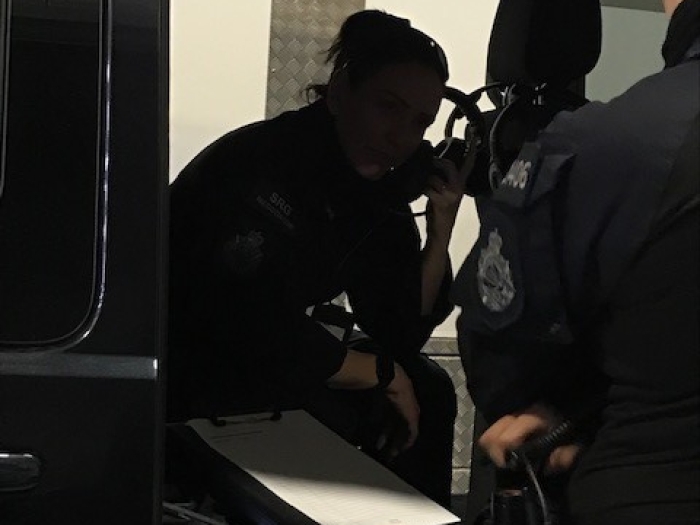
Do not use this form for reporting or complaints, please use the right form:
Report a crime
Make a complaint
Or contact the AFP
This form is for page feedback only and is used to improve our website, feedback will NOT be responded to or forwarded.
Error message
- AustraliaDreamer
- Travel To Australia With Criminal Record
Traveling to Australia can be an exciting and enriching experience for individuals from all walks of life. However, if you have a criminal record, it's important to understand the travel restrictions and requirements that may apply to you before planning your trip. In this guide, we will explore the various aspects of traveling to Australia with a criminal record and provide valuable information to help you navigate the process.
Understanding Australian Travel Restrictions for Individuals with Criminal Records
Researching visa options for travelers with criminal records, preparing for the visa application process, arriving in australia with a criminal record: what to expect, seeking legal assistance and support services, understanding the rehabilitation process in australia, 1. can i travel to australia with a criminal record, 2. what type of visa do i need to travel to australia with a criminal record, 3. will my criminal record affect my chances of getting a visa, 4. are there any restrictions or conditions i need to comply with when traveling to australia with a criminal record.
Australia has strict immigration policies in place, including regulations for individuals with criminal records. The Australian government prioritizes the safety and security of its citizens and visitors, which is why there are certain restrictions on entering the country with a criminal history.
It's crucial to understand that each case is assessed individually, and the severity and nature of the offense will play a significant role in determining your eligibility to enter Australia. The Australian Department of Home Affairs thoroughly evaluates visa applications and conducts character assessments to ensure that individuals with criminal backgrounds do not pose a risk to the community.
Before applying for a visa, it's essential to research and understand the available options for travelers with criminal records. Depending on the nature of your offense, you may need to explore specific visa subclasses designed for individuals who have had previous legal issues.
Some of the common visa subclasses that individuals with criminal records may consider include the Subclass 600 Visitor Visa, Subclass 651 eVisitor Visa, or the Subclass 188 Business Innovation and Investment Visa. Consulting with an immigration lawyer or a registered migration agent can provide valuable guidance in selecting the most appropriate visa category for your specific circumstances.
When applying for a visa to travel to Australia with a criminal record, it's crucial to be transparent and provide all necessary information related to your criminal history. Failure to disclose accurate information can result in visa refusal or even a ban from entering Australia in the future.

Additionally, you will need to gather supporting documents, such as court records, character references, and any relevant rehabilitation certificates. These documents will help the Australian authorities assess your character and determine whether you meet the requirements for entry.
Upon arriving in Australia, individuals with criminal records may be subject to additional screening and questioning by the Australian Border Force. It's essential to remain calm and cooperate with the authorities during this process.
Keep in mind that having a criminal record does not automatically mean you will be denied entry. The Australian Border Force will consider factors such as the time that has passed since the offense, your rehabilitation efforts, and the potential risk you may pose to the community.
If you are unsure about your eligibility to travel to Australia with a criminal record or need assistance with the visa application process, it is highly recommended to seek legal advice. An experienced immigration lawyer or registered migration agent can provide tailored guidance based on your specific circumstances and increase your chances of a successful visa application.
Additionally, there are support services available for individuals with criminal records who are planning to travel to Australia. These organizations can provide information, guidance, and emotional support throughout the process.
Australia recognizes the importance of rehabilitation and offers support programs to individuals with criminal records who wish to reintegrate into society. If you have successfully completed a rehabilitation program or can demonstrate significant efforts towards personal growth and rehabilitation, it can positively influence the assessment of your character by the Australian authorities.
It's crucial to provide evidence of your rehabilitation efforts and any relevant certificates or documentation to support your case. This can include participation in counseling, education, community service, or other programs aimed at personal development and preventing future offenses.
Traveling to Australia with a criminal record may present certain challenges, but it's not an impossible task. By understanding the travel restrictions, researching visa options, and preparing your application thoroughly, you can increase your chances of a successful trip to Australia.
Remember to seek legal advice, gather supporting documents, and be transparent throughout the process. By demonstrating your rehabilitation efforts and complying with the requirements set by the Australian government, you can embark on a memorable journey to Australia.
Frequently Asked Questions
Yes, it is possible to travel to Australia with a criminal record. However, individuals with criminal records are subject to thorough assessments, and each case is evaluated on its own merits.
The type of visa you need will depend on various factors, including the nature of your offense. Consult with an immigration lawyer or registered migration agent to determine the most suitable visa subclass for your circumstances.
Having a criminal record can affect your chances of obtaining a visa to travel to Australia. However, the Australian authorities consider several factors, including the time elapsed since the offense and evidence of rehabilitation.
Individuals with criminal records may be subject to additional screening and questioning upon arrival in Australia. It's important to cooperate with the authorities during this process and comply with any conditions imposed on your visa.
Travel To Australia On A Uk Passport
To Travel To Australia From Nz
New Zealand Can Travel To Australia
Travel To Australia On Indian Passport
Temporary Resident Visa Can Travel To Australia
Travel To Australia Passenger Locator Form
Deja una respuesta Cancelar la respuesta
Tu dirección de correo electrónico no será publicada. Los campos obligatorios están marcados con *
Guarda mi nombre, correo electrónico y web en este navegador para la próxima vez que comente.
- Information and Advice
- Advice articles
Travelling to Australia
Our mission is to support & advocate for people with criminal records to be able to move on positively in their lives. Find out more
- Specific countries
Click here for the index of this page
Aim of this information, why is this important, introduction, an evisitor.
- An Electronic Travel Authority
Criminal convictions
Good character test, applying for a visa if you’ve been convicted of a sexual offence, what happens if you do not pass the good character test, how will your application be decided, what if they say no, personal experiences, discuss this with others, useful links, for more information, get involved.
This information is designed to set out the types of visa required for travel to Australia and how a criminal conviction may affect your ability to get a visa.
People with criminal records are not barred from travelling to Australia. However, it’s important to know how a criminal record determines the type of visa you should apply for and whether or not you are likely to meet the good character test.
Visas are required for all travel to Australia. British citizens can obtain the following types of electronic visitor visa:
- an eVisitor visa direct from the Department of Immigration and Border Protection . There is no visa application charge or service fee for this;
- an Electronic Travel Authority (ETA) via the Australian ETA app. There is no visa application charge, but a service fee of $20 may apply.
- An eVisitor is designed for people who are outside Australia and want to visit Australia for tourism or business purposes.
- Tourism includes holidays, recreation and seeing family and/or friends. Business purposes may include attending a conference, negotiation or exploratory business visit.
- eVisitor applications are free, there is no application charge or service fee.
- An eVisitor lets you stay in Australia for up to three months on each visit within a 12 month period from the date of grant.
- An application for the visa can be made online here .
For more information, visit the Department of Immigration and Border Protection .
An Electronic Travel Authority (ETA)
An ETA Tourist Visa allows you to stay in Australia for up to 3 months on each arrival within 12 months from the date the visa was granted.
Although there is no visa application charge, a service fee of $20 applies.
An example of this is the Australian Visa Bureau but other services are available.
A Visitor Visa (Subclass 600)
A Visitor Visa gives more flexibility in the length of stays that are permitted in Australia. There is a substantial charge for this type of visa and they can often take over a month to process (see here for more details).
You may require other visas for transit through Australia to another destination or if you are visiting Australia for reasons other than a holiday.
As part of the eligibility requirements to obtain any of the above, it states that:
You must not have any criminal convictions, for which the sentence or sentences should not equal a total period of 12 months duration or more (whether served or not), at the time of travel to, and entry into, Australia.”
This implies the following:
- If you received two 6 month sentences, you would be ineligible to apply online, and would have to apply for a full Tourist Visa.
- If you have received a 12 month sentence, but only served, for example, 6 months, you would still have to apply for a full Tourist Visa.
- If you have received a 12 month suspended sentence, and therefore never stepped foot in a prison, you would still have to apply for a full Tourist Visa.
- The Australian authorities do not recognise the difference between concurrent and consecutive sentences. Therefore if you were convicted of two offences and received two six month sentences to run concurrently, the Australian authorities would consider this to equal a 12 month sentence and you would have to apply for a full Tourist Visa.
If you fall into the category of ‘criminal convictions’ set out above, in order to travel you must pass what the Australian government calls ‘the character requirement’ (as defined in Section 501 of the Migration Act 1958). You are likely to fail this test if you have a ‘substantial criminal record’ .
A person is deemed to have a substantial criminal record if they have been:
- sentenced to either death or life imprisonment
- sentenced to a term of imprisonment for 12 months or more
- sentenced to two or more terms of imprisonment (whether on one or more occasions), where the total of those terms is two years or more
- acquitted of an offence on the grounds of either unsoundness of mind or insanity and, as a result, the person has been detained in a facility or institution.
- they have, or have had, an association with an individual, group or organisation suspected of having been, or being, involved in criminal conduct
You are also likely to fail the good character test if there is a risk that you would:
- engage in criminal conduct in Australia
- harass, molest, intimidate or stalk another person
- vilify a segment of the Australian community
- incite discord in the Australian community or a segment of that community
- represent a danger to the Australian community or a segment of that community by becoming involved in activities that are disruptive to or threatening harm to that community
In February 2017 amendments were made to the Australian Migration Act 1958 which will affect those who have been convicted of a sexual offence who are considering travelling to Australia.
Any new visa applications will be refused or existing visa’s cancelled if, a court in Australia or a foreign country has:
- convicted you of one or more sexually based offences involving a child; or
- found you guilty of such an offence, even if you were discharged without a conviction (for example you received an absolute discharge).
If an Interpol green notice is in force, then the Australian authorities will infer that you would present a risk to the Australian community and any visa application will be refused or existing visa revoked. Interpol green notices are often given to people on the Sex Offenders Register
Even if you fall into the above, you will not automatically be refused a visa. Another requirement of the ‘good character test’ will look at what you have done (and how you have behaved) since being sentenced. You may want to give some thought to what evidence you could provide to show this. The Australian Department of Immigration and Border Protection will use their discretion as to whether or not to approve your application.
When a visa applicant or visa holder does not pass the character test, immigration officials will decide whether to refuse the application or to cancel a visa. Exercise of this discretion will take into account a wide range of factors, including the protection of the Australian community, the expectations of the community, the best interest of any children under 18 years of age, as well as other considerations such as the non-citizen’s links to Australia, and any relevant international law obligations.
‘I managed to get into Oz with a record (24 month sentence) even though my offence made it impossible to enter the country. I had to bend over backwards to get all the necessary paperwork together but the point is that if you have a record there is a chance of getting in. I’m working with explosives now – this would have been unheard of in the UK.’
If your visa application is cancelled on the grounds of either a substantial criminal record, or another character issue, you are permanently excluded from Australia.
There is generally no appeals procedure if you have been refused an eVisitor or ETA. The only visitor visa that may have a right to appeal in very limited circumstances is the sponsored visitor visa.
If you have a substantial criminal record or a character issue then you should seek advice from the Migration Institute of Australia (MIA) . This organisation has contacts in the UK, providing migration advice to prospective migrants, workers, students, families and humanitarian entrants and to employers seeking to obtain skilled overseas workers.
The personal story below has been posted on theRecord, our online magazine.
Dealing with my barriers and borders – a story from Carlotta, one of Unlock’s trustees who has recently travelled to Australia
Read and share your experiences on our online forum .
Key sections include:
- Travel to Australia
Below you will find links to useful websites relating to this page. More specific details (including addresses and telephone numbers) of some of the organsiations listed below can be found here .
- ACRO Criminal Records Office
- Department of Immigration and Border Protection
- For practical information – More information on character and police certificate requirements can be found on the Australian Government Department of Immigration and Border Protection website
- To read personal stories – You can read stories about this posted on theRecord, our online magazine under the tag travelling abroad
- To discuss this issue with others – Read and share your experience on our online forum
- Questions – If you have any questions about this, you can contact our helpline
- Comment on this information (below)
- Send your feedback directly to us .
- Discuss your views and experiences with others on our online peer forum .
- Share your personal story by contributing to our online magazine, theRecord .
I have a conviction from 1967 for ‘Receiving Stolen Property’ for which I was sentenced to a fine of £20 or 3 months imprisonment. Would such a conviction bar me from entering Australia?
Although you’d need to disclose your conviction if asked on the ETA or visa application, it definitely wouldn’t automatically bar you from entering Australia.
Best wishes
Hi, I was in a violent relationship between 5-9 years ago when I was 18-23 in which I received more than 12 months prison sentence (time not served). I have never been in any sort of trouble outside of this relationship and this person still tries to contact me even now (even though I am the apparent abuser). What would the likelihood be of me being completely refused entry or what further steps would I need to take? This would be for either an eVisitor and I am looking to move there in the future as my boyfriend lives there.
I have a dismissed case 7 years ago for theft. The company of my husband under subclass 482 want to sponsor me. Will my application denied? I have a current job for almost 6 years now and I have a good character on my job. Thinking this depressed me so much 😢
I have a 2 year suspended sentence for ABH/wounding from 14 years ago when I was 18 years old, would this stop me getting a visa?
Unfortunately, as you received a 2 year suspended sentence you would not be eligible to apply for the Electronic Travel Authority, you would need to apply for a full tourist visa.
Don’t assume that just because you have a conviction you will automatically be refused a visa. In your favour is the fact that the conviction is old, you were very young when you received it and you have nothing else on your record. The Australian Department of Immigration and Border Protection will take into consideration what you have done since you were convicted and will look at each application on a case by case basis.
I received a penalty notice for disorder and spent the night in a police cell. Is this something I would need to disclose as a conviction?
A Penalty Notice for Disorder (PND) is not classed as a conviction and wouldn’t need to be disclosed when applying for the majority of jobs or when making visa applications. You can find further information at https://unlock.org.uk/advice/penalty-notice/ .
Thanks for the awesome website.
I was given a six-month suspended sentence for offensive behaviour (urinating in public!) in my 20s, nearly 28 years ago, but the offence is hidden (but not erased) from government records under NZ’s “clean slate” law.
Do I have to declare this on the Australian immigration form?
Many thanks.
Hi I have a drink driving conviction from 2012 which I recieved a 9 month driving ban and a conviction from 2013 for breaking a car window when drunk and paid a fixed penalty for this. Do these two records create a struggle for entry to aus for me?
As you can see from the above information the Australian authorities are only really interested in prison sentences or suspended sentences which equal more than 12 months. I’m sure your driving disqualification and fixed penalty notice will not stop you from travelling to Australia.
My husband got into an argument with a traffic officer in 2021 and there for had to pay a fine now it is against his name as criminal offence called crimen injura, will it affect his working visa application
Before anything allow me to thank you for your time. I’m currently in the process of applying for an urgent visitors visa to Australia with an agent. I do have a felony conviction for a weapons charge well over 10 years ago. I was never sentenced to prison time. I received 5 years probation and completed my probation successfully. It’s one of my biggest regrets. Should I be concerned that my visa will be denied?
I have 2 drink drive convictions from 22 yrs ago and 17 yrs ago, do I need to disclose these as so long ago. Also just got driving bans for both
20 November 2008 an order was made for my deportation to my homeland from USA. I were unaware of my deportation order and continued about my life in the U.S. until January 2019, when a Homeland Security Agent detained me at your home. During the process they found an unregistered firearm in my home (locked in your safe) and this led to a Federal criminal conviction of ‘Possession of an unregistered firearm’. In August 2020 I was sentenced to 30 months imprisonment for this conviction. I served 6 months of my sentence in prison and 24 months in immigration detention. After my sentence, I was deported back to my homeland. I seek more information about your visa options and the quickest way that will allow me to get a visa to Australia to join my girlfriend (which happen to be an Australian citizen) we are ready to go with the prospective visa too! is there any big chance for us?
Hi Unlock, I was recently put in a police cell over night for drunk and disorderly behaviour (just arguing with bouncers and police – very out of character but was my own drunken fault). From this I received a Community Resolution (alcohol awareness course) which I completed immediately, do I need to disclose this when applying for visas in Australia/New Zealand as I am travelling there next year and worried about entry, I am also interested about America since they’re also strict when applying for ESTAs/visas. Thank you
As a Community Resolution Order does not result in a criminal record it’s not something that would need to be disclosed for visa purposes.
I got into trouble 11 years ago and was handed a 12 month community order where I had to complete 70 hours unpaid work. I’m uk based and travelled to Australia on a Working holiday visa 3 years later in 2014 I had to send away for a police report but my visa was accepted and I spent a year there. I’m now travelling to Australia in January for business purposes, what visa would I require, do I have to declare this and will I need to send away for a police report again?
I’m not sure what visa you’d require for a business trip to Australia so it’s probably worth having a look at the ‘Visa Finder’ section of the Australian High Commission website – https://uk.embassy.gov.au/ .
Most visa applications will ask for an upto date police certificate and I would imagine that the one from 3 years ago would probably be too old. As visa applications are exempt from the Rehabilitation of Offenders Act, you would need to disclose your conviction from 11 years ago.
I hope this is helpful.
Hi. I was fined 4000NOK almost 5 years ago for having THC in my urine. It is not in my police certificate anymore. Is this something i need to inform on visa application for australia?
If your police certificate states ‘No Trace’ then you have nothing to disclose on your visa application.
Hi, I am in a similar position and my certificate shows “no trace” but they ask about criminal records and not just convictions so would this not need to be disclosed?
If your Police Certificate states ‘No Trace’ this means that there is nothing recorded on the Police National Computer (PNC) and therefore nothing to disclose. If however the Certificate states ‘No Live Trace’ this means that there is something recorded on the PNC but enough time has passed for it to no longer be necessary to disclose it on the Certificate – you would however need to disclose it to the Australian Embassy when applying for your visa.
I hope this is helpful but if you require any further information, please feel free to give our helpline a call.
Thank you for your reply- very useful.
Kind regards
Hi, just wondering if there’s any chance I can go to Australia to visit family, I have a criminal record and have served over 12 months of sentences, I haven’t been in trouble for over 5 years and haven’t had a custodial sentence for over 10 years, any advice would be much appreciated, cheers
As you are aware, as you received a prison sentence of over 12 months, you would not meet the eligibility requirements to gain entry into Australia. In addition to this, due to the length of the sentence it’s likely that you would not pass the good character test.
However, just because you fall into these categories, you will not automatically be refused a visa. The ‘good character test’ also looks at what you have done since you were convicted. Your police certificate will show that you’ve had a clean record for over 5 years and other evidence you may want to present could be proof of employment, voluntary work you’ve carried out etc.
The Australian Department of Immigration and Border Protection will deal with each application on a case by case basis.
Hope this is helpful.
I have convictions from 20 years ago, all fines and community orders but I don’t know when exactly they were and what the sentences were. What do I do? I can’t declare them because I do t know what they are exactly
If you’re unsure of the details of any conviction then I’d suggest applying for a copy of your police record (sometimes referred to as a Subject Access Request). This will show the date of the conviction, what you were convicted of and the sentence or disposal you received. You can apply for this by emailing the ACRO Criminal Records Office at [email protected] . You can find further information at https://unlock.org.uk/advice/police-records/ .
In 2020 I was sentenced to a 12 month conditional discharge, in relation to a harassment in 2017 ( took the police 3 years to investigate and to get the charging decision they manipulated the system) The discharge is now spent and my police certificate shows I have no convictions. This has also been confirmed in writing by a detective Sgt in the police. The sentencing remarks from the crown court judge were that, at the time of sentencing I was of “exemplary character”…… I had no record prior to the incident and have had nothing since (6 years) The Australian immigration dept or “VACCU” as they call themselves have all the information above yet it has now taken them 2 years to process my visa under the “character assessment” and I still do not have an answer. I have a sister who is a resident in Australia and an 18 month old niece who I have never met because this application for a tourist visa so I can visit has taken so long!!! I have contact the minister for immigration, spoken to unlock, spoken to a solicitor and no one seems to be able to help
Any advice from Unlock on this matter would be really helpful???
I received a police warning for violent disorder aged 13 which has been stepped down. It states on my police check that there is no live trace. I have submitted supporting evidence on the immi website but I was wondering if anyone has experience of a time frame it takes for the further assessment?
12 years ago I received a caution for possession of a class A substance with intent. It now states “no love trace” on my acro certificate.
This was due to me been is possession and on this occasion passed it onto my partner at the time, which made it with intent to supply.
Iv never been in any trouble with the police before or after this time and does not reflect how iam to this present day. I have also been in constant full time employed work and working with vulnerable adults with LD for 4 years.
How would this effect my chances of obtaining a holiday or work visa?
Any help with this would be greatly appreciated
As you may have seen from the information page, as part of the eligibility criteria the Australian authorities state that:
“You must not have any criminal convictions, for which the sentence or sentences should not equal a total period of 12 months duration or more (whether served or not), at the time of travel to, and entry into, Australia.”
It’s extremely unlikely therefore that a caution you received 12 years ago would result in an automatic refusal of a holiday or work visa.
Leave a Reply Cancel reply
Your email address will not be published. Required fields are marked *
Save my name, email, and website in this browser for the next time I comment.
Learn more about this topic
- Take Action Toolkit
- ‘How long do I have to disclose my criminal record for?’ – A detailed guide to the Rehabilitation of Offenders Act 1974
- Help and support for your mental health
- Job application tips from Unlock
- Drag-through explained
Most popular articles from Unlock
- Youth rehabilitation order (under 18)
- International Child Protection Certificate (for working overseas)
- Travelling to the US – Will I get a visa?
- Travelling to the UK
- Savings accounts and credit union accounts in prison

Do you need help & support with an issue you’re facing?
We provide support and advice for people in England and Wales who need guidance with either their own, or someone else’s, criminal record.
Please use the search box to start typing your issue. If you cannot find an answer to your problem then you’ll be given options to contact us directly.
Popular advice
- Information: Relationships, children and dealing with social services
- Information contained on UK passports
- What will be disclosed on a basic DBS check?
We want to make sure that our website is as helpful as possible.
Letting us know if you easily found what you were looking for or not enables us to continue to improve our service for you and others.
Thank you for your feedback.
12 million people have criminal records in the uk. we need your help to help them., we use limited cookies.
We use cookies where necessary to allow us to understand how people interact with our website and content, so that we can continue to improve our service.
We only ever receive anonymous information, and cannot track you across other websites. Find out more
More Options
Cookies that allow us to collect anonymous data to help us improve the website. We never share this data and cannot identify anyone from what we collect.
Can I Travel to Australia with a Criminal Record?
Tourism is an important economic sector and most countries welcome foreign visitors.
Australia is no exception, but local authorities take the safety of their citizens seriously and there are certain provisions that bar access to the country to potentially dangerous people.
In order to obtain a tourist visa for Australia you must have a clean criminal record. Or almost clean.
Let’s have a look at the requirements for the different types of visas available for foreign tourists wanting to visit Australia.
Types of Tourist Visas for Australia
In order to travel to Australia for a holiday or for business reasons, you must first apply for a visa.
In some cases, the process can take up to 30 days so make sure to take this into account when you plan your trip to the land of Oz.
There are two main types of visas you can apply for:
- eVisitor (Subclass 651) is a visa you can obtain from the Department of Immigration and Border Protection. This can be obtained online and is totally free.
- ETA or Electronic Travel Authority is a visa that can be obtained through your travel agent or the airline that will take you to Australia. While the visa is still free, expect to pay a $20 service fee. Check out the Australian Visa Bureau to learn more about ETA visas.
Both types of visas allow for a stay of up to three months within the next 12 months and can be used for business purposes, as well as visiting the country or friends and family living in Australia.
For longer, more flexible stays you should apply for a Subclass 600 Visitor Visa.
Can I Visit Australia if I Have a Criminal Record?
Obtaining a visa for Australia sounds very simple and, in most cases, it is, unless you have a criminal record.
Foreigners with a criminal record need to apply for a full tourist visa from the Australian Home Affairs. The conditions state very clearly that you can hope to get such a visa only if you don’t have a substantial criminal record.
What does this mean?
You must not have criminal convictions carrying a sentence of 12 months or more in jail. Keep in mind that two six-months convictions served concurrently in your home country (that is you were actually in jail for only six months), in Australia they count as a full 12 months prison sentence, making you ineligible for the visa.
As part of your visa application vetting you will be required to pass a Character Test and will probably fail if you have a substantial criminal record. It should be noted that all police checks in Australia come at a cost of normally around $48 AUD per check. You cannot just simply get a free police check.
At the same time, if you have previously spent more than one year in Australia you might be asked to provide a police check for that period to demonstrate that you did not commit any criminal offences while in the country. National police checks for immigration purposes can be obtained via the Australian Federal Police.
If you are applying to work in Australia then you can get it online from a character check agency and can get started by completing an online application form.
Bottom line - having a criminal record does not mean that you have no chance to obtain a tourist visa. You can apply for a tourist visa and prove that the criminal offences you were found guilty of are well in the past and you have changed your life since then, by answering truthfully to the Character Test.
Keen to Travel to Australia?
Whether you have always wanted to visit Sydney, take a road trip in Australia or travel the beautiful East Coast of Australia or see the spectacular Outback, Australia really won't disappoint. Thousands of people also go backpacking or take a gap year in Australia every year. Check your eligibility today and search more information about visas online.
- Leave a reply
Provide feedback, share your experience and submit your comment.
Related Articles
How to get a second year australia working holiday visa.
Australia is an incredible destination and it is no suprise that thousands of people apply to work here every year. I...
Study Abroad in Australia
Interested in going to study in Australia? Check out our guide which includes information about popular destinations,...
How to Get a Visa or Permit to Live in Spain
Spain is one of the most popular destinations for foreigners to live, and is it easy to see why. Spain has a warm cli...
Seasonal Jobs & Working Holidays in Australia
Australia is the perfect destination to live and work, expect friendly people, warm weather, an outdoors and a laid back...
Top Reasons to Work on a Vineyard in Australia
Want to take a gap year, or extended holiday, but haven’t got the funds? A working holiday in Australia might be the p...
Australia Travel and Backpacking Guide
Australia is an incredible country with iconic cities, world famous coral reefs, luscious rainforests and beaches gal...
itravelnet.com
Travel blog and travel directory
Travelling to Australia with a criminal record? Things you need to know.
November 29, 2020 By itravelnet.com

Australia has very strict laws concerning foreign tourists and all types of visas require strict police checks. Here are the different types of visas explained.
eVisitor visas
Many people around the world dream of a holiday in sunny Australia, but all foreign tourists will need a visa before they can start packing. One way of making your dream come true is to apply for an eVisitor visa , which is easy to obtain online and it’s free. This type of visa allows you to travel to Australia for up to three months, whether as a tourist or for business purposes. Professionals wishing to attend a conference in Australia will also have to secure this type of visa.
Electronic Travel Authority tourist visas
This type of visa is available for people visiting from countries like the United States, Canada, Taiwan and many European countries. This visa cannot be obtained online and you will have to check with your travel agent or airline to see what you need to do in order to be allowed to travel to Australia. Such visas allow for a stay of up to three months each time you enter the country within the next 12 months from the moment you were granted an ETA visa.
Visitor Visa
Although similar to the other two types, a Visitor Visa Subclass 600 is preferable as it allows you to stay in Australia for more than three months at a time.
Can you travel to Australia with a criminal record?
All types of tourist visas for Australia require full disclosure of your criminal record. According to Australian law, people with a ‘substantial criminal record’ will be automatically denied entry. This term, ‘substantial criminal record’, refers to the length of the sentences dictated by a criminal court in your country of origin or even on Australian territory.
To put it simply, you cannot get a tourist visa if you were sentenced to more than 12 months in jail, no matter the offence. What you should keep in mind is that the Australian legal system does nor recognize the concept of concurrent sentences. Let’s say that you were convicted on two counts, receiving two six months jail terms to be served concurrently. Even if you spent only those six months in prison, as far Australian authorities are concerned you were convicted to 12 months in jail, which makes you ineligible for a tourist visa. You can find out more and learn about frequently asked questions for Australian police checks by clicking on this link.
A suspended sentence of 12 months or more might also be used as a reason for your application to be rejected.
You will need to provide a background check
Australian authorities require applicants to answer truthfully to all the questions concerning their criminal record and it is in your best interest to do so as you might be asked to provide an AFP police check. If you have been living in different countries you might be required to submit a police check for each of them.
Foreigners who wish to reside on Australian territory for a period of 12 months or more anytime in the past might be required to provide a background check from the national AFP police. This can easily be obtained through the AFP police clearance agency that offers checks for all Australian states and territories.
Please refer to the Australian character check website on https://www.australiannationalcharactercheck.com.au/ if you would like information on the minimum requirements and costs associated with lodging an Australian police clearance. They have a live chat option available which lets users get instant access to commonly asked questions.

Follow itravelnet.com
Hotel Directory
Recently updated.
National Parks Travel Gear Business Travel USA Texas Cabo San Lucas
Site Search
(02) 7205 5934
- Find Court Date
- Book A Lawyer
Table of Contents
What is a criminal record in australia, what offences go on criminal record, do countries share criminal records, how long does a criminal record last in nsw, does a criminal record effect my visa application.

If you have a criminal record in Australia, it will likely affect your ability to travel overseas. The answer depends on several factors, including the nature of the criminal offence, the country you want to travel to, and the laws and regulations of that particular country. Most traffic offences will not affect overseas travel.
Furthermore, having a criminal conviction in Australia may impact your ability to obtain a passport or a visa, and it may also result in difficulties entering certain countries.
A criminal record in Australia refers to a documented record of an persons criminal history. The document includes details of their convictions, findings of guilt, and other relevant information related to their involvement in criminal offences. These background checks are maintained by state and territory police agencies, and they play a significant role in the criminal justice system in Australia.
What Information Does it Contain?
A criminal record typically contains information such as the persons name, date of birth, physical description, fingerprints, photographs, and details of the offence(s) they have been convicted or found guilty of. It includes information about any charges or arrests, court appearances, and the outcomes of legal proceedings, including criminal convictions, dismissals, or acquittals and if you have plead guilty to an offence.
Criminal records are typically created when an individual has been charged with a criminal offence and the charge has resulted in a conviction or finding of guilt by a court of law.
The types of offences that may be included in a criminal record can vary widely and may include both minor and serious offences. This includes criminal convictions such as assault, sexual offences , theft, drug offences, fraud, traffic offences such as drink driving, and other criminal acts as defined by Australian law. Criminal records are maintained for individuals who have been convicted or found guilty of offences under Australian law, regardless of whether the offence was committed in Australia or overseas.
In addition to this a criminal record can have long-term consequences, including potential impact on employment opportunities, travel overseas, and other aspects of an persons life.
In Australia, criminal records are subject to strict privacy and security regulations to protect the confidentiality and integrity of the information contained in them. Access to criminal records is generally restricted to authorised personnel. This includes law enforcement agencies, courts, and other government agencies involved in the administration of justice. However, in some cases, certain individuals or organisations can obtain access to criminal records through legal processes such as Freedom of Information (FOI) requests or as required by law.
A criminal record is not a static document and may change over time based on legal processes, such as spent convictions or record expungements, which may result in certain offences being removed from an persons criminal record. The rules and regulations regarding criminal records in Australia may vary by state and territory.
In Australia, criminal records are maintained by state and territory police agencies and are commonly referred to as “police records” or “criminal history records”. These records typically include details of convictions and findings of guilt for criminal offences, including both minor and serious offences. Some of the common offences that may go on a criminal record in Australia include assault, theft, drug offences, sexual offences, fraud, and traffic offences such as driving under the influence (DUI) or reckless driving.
Going To Court?
Send an online enquiry.
Your Phone Number
Your Enquiry
Drug Convictions and Travel
Drug convictions in Australia can have an impact on your ability to travel overseas, particularly to certain countries. Many countries have strict entry requirements and may deny entry or impose restrictions on individuals with drug convictions or a criminal record.
For example, the United States and Canada are known to have stringent entry requirements and may deny entry to individuals with drug convictions, depending on the severity of the offence. Similarly, countries such as Japan, China, and the United Arab Emirates also have strict drug laws and may impose travel restrictions on individuals with drug convictions.
There are various immigration policies and entry requirements which can vary from country to country and may change over time. Therefore, you should check the entry requirements of the specific country you plan to travel to and consult with the relevant embassy or consulate for up-to-date and accurate information.
Yes, countries often share criminal records with each other through various international agreements and treaties. This is done to prevent criminals from evading detection and entering other countries to commit further offences.
Many countries, including Australia, have reciprocal arrangements for sharing criminal records with other countries, especially in cases where an individual has been convicted of a serious offence or poses a potential threat to national security. Therefore, if you have a criminal record in Australia, it is possible that other countries may be able to access and review your criminal history when you apply for a visa or enter their borders.
In New South Wales, the length of time that a criminal record lasts depends on the type of offence and the age of the offender at the time of the offence. In general, criminal records in NSW are retained for life. However, certain offences may be eligible for “spent convictions” under the Crimes (Sentencing Procedure) Act 1999. This is under the spent convictions scheme which allows for certain convictions to be removed from an persons criminal record after a specified period of time has elapsed without further convictions.
The eligibility for spent convictions depends on various factors, including the nature of the offence, the age of the offender at the time of the offence, and the length of time since the offence occurred. Spent convictions are not erased completely, but rather become “spent” and may not be disclosed in certain circumstances, such as when applying for employment or obtaining insurance.
A criminal record can potentially impact your visa application in Australia. When applying for a visa to enter or stay in Australia, the Department of Home Affairs conducts character assessments to determine if you meet the character requirements set out in the Migration Act 1958. Having a criminal record may be considered as evidence of not meeting the character requirements, which could result in your visa application being refused or cancelled.
The Department of Home Affairs considers various factors when assessing the character requirements. These factors include the nature and seriousness of the offence, the sentence or penalty imposed, the time elapsed since the offence, and your overall criminal history. Offences that may raise concerns and impact your visa application include but are not limited to, offences involving violence, sexual offences, drug offences, offences against minors, and offences that involve dishonesty or fraud.
A criminal record, whether in Australia or another country, can affect your visa application in Australia. The Department of Home Affairs has access to a comprehensive database that includes criminal records from various countries, and this information may be taken into consideration during the character assessment process.
If you have a criminal record and are applying for a visa in Australia, it’s crucial to be transparent and provide accurate information about your criminal history in your visa application. Failure to disclose a criminal record or providing false or misleading information can have serious consequences, including visa refusal, visa cancellation, or even deportation if you are found to have misrepresented your character.
However, it’s not an automatic visa refusal if you have a criminal record. The Department of Home Affairs will assess your character on a case-by-case basis, taking into consideration the specific circumstances of your offence and your overall conduct. For example, if you have a minor offence and have taken steps to rehabilitate and demonstrate good character since the offence, it may be viewed more favourably.
It’s highly recommended to seek legal advice and guidance from a criminal defence lawyer travelling from Australia with a criminal record. Our criminal lawyers in Liverpool can also help you prepare and present your case in the best possible manner to maximise your chances of a successful sentence.

Lyons Law Group is a boutique firm of expert criminal solicitors and barristers. Lyons Law Group is dedicated to strong advocacy when representing its clients with an approach that is tailored to every client’s specific needs.
Lyons Law Group
Useful links.
- Legal Aid NSW
- Traffic Law
- Criminal Law
- Your Rights
- Privacy Policy
Main Office: Level 3, 302/58 Kitchener Parade Bankstown NSW 2200
Sydney Office: Level 1, 60 Martin Place Sydney NSW 2000 (By Appointment Only)
Parramatta Office: Level 49, 8 Parramatta Square, Parramatta NSW 2150 (By Appointment Only)
Can You Travel to Australia With a Felony – Everything You Need To Know
Has a trip to Australia been on your mind lately? Can you travel to Australia with a felony conviction and if so, how do you go about it?
In this blog post, you’ll learn everything you need to know about traveling to Australia with a criminal record. You’ll see how to arrange a trip to Australia with a felony on your criminal record and what documentation is involved in such a process.

Can you visit Australia with a criminal record?
Can you go to australia with a felony – denial of entry.
A US citizen with a criminal record can travel to Australia. You can apply online for documentation enabling you to visit their country. All you need to do is go to the Australia Online Visas website and click the big, green button to begin the application.
You can achieve that by filling out one of the following:
- Electronic Travel Authority (ETA) visa;
- eVisitor visa.
Successfully applying for one of them will grant a US citizen permission to cross the border of Australia.
These documents will involve 2 (two) sections that require detailed information about:
- character detail questions (have you ever been charged with a crime that awaits legal action, for example);
- the declaration section.
The declaration part of the application will include queries, such as:
- Were you accused of any criminal activity that resulted in a jail sentence of over 1 (one) year?
- Have you been charged or convicted of domestic abuse?
- Have you ever been the subject of family abuse?
Only by completing the declaration part can you finally be eligible for an ETA visa and travel to Australia with a felony.
An applicant for either the Australian ETA or the eVisitor visa must answer all the questions truthfully. Do not omit anything about your previous criminal convictions. The more cooperative and honest you are, the higher your chances of acquiring sufficient documentation.
Related readings:
- Can a Felon Get a Passport? It Depends
- Can You Get a Passport With a Bench Warrant?
- Australian Passport Photo Size Template
A US felon going to Australia – ETA visa
An ETA visa is essentially a travel document that will enable its holder to freely travel to and from Australia for a variety of purposes:
- visiting loved ones
- short-term study
- volunteer work.
You cannot, however, study or take part in training for longer than 3 (three) months with this visa. What’s more, while volunteer work is allowed, paid work while using an ETA visa is prohibited for felons.
You can begin the application process on the official Australian Online Visa website and click on “Apply for an ETA.” Once you’re in, you’ll have to input personal information and your travel details in an online questionnaire.
You will receive a decision regarding the crucial document within 2 (two) working days via email.
A US felon going to Australia – eVisitor visa
Another document that someone with a criminal conviction can get is an eVisitor visa, valid for 1 (one) year. It is an electronic travel document, just like the previous one, requestable through the same means as an ETA visa.
The eVisitor applies to the same purposes of your visit to Australia as an ETA visa, meaning, for example, tourism or volunteer work.
A felon wishing to apply for this type of visa must visit the Australian Online Visa website to complete the questionnaire.
Once they complete and receive the paper, a US felon is officially free to enter Australia.
That being said, there are instances when your criminal history will prove too serious to be allowed into the country. If you’ve committed severe crimes in the past, successfully applying for visas will be impossible.
Such serious crimes involve any infringement that resulted in a prison sentence longer than 1 (one) year .
Moreover, any risk of crimes deemed possible by the border control agent will be enough to dismiss your entry. The risks include:
- engaging in criminal activities;
- posing danger to the local community;
- inciting aggression towards a segment of the Australian community;
- harassment of Australian citizens.
Offenses you committed even 10 (ten) years ago will be deemed relevant when applying for a visa.
You might also fail to pass a character evaluation test when applying for documents needed to travel to Australia. It may result from:
- a severe criminal record;
- escaping detention;
- being a member of an organization that’s deemed dangerous by the Australian Minister;
- being a suspect of, for instance, genocidal, smuggling, slavery, or war crimes;
- failing to present yourself as a non-risk guest (indicating that you’re more likely to engage in criminal activity);
- having been convicted of sexual offenses involving minors;
- having been convicted of domestic violence;
- being subject to an Interpol notice.
The decision on whether the Australian authorities approve of the application will arrive within 48 hours.
Passport Photo Online – a dependable photo app
Should the requirements change and you find yourself in need of a passport style photo for the ETA visa, Passport Photo Online will be of tremendous help. This app will turn your smartphone into a professional photo booth, open 24/7, always ready to produce quality photos in a matter of seconds.
For a price of just $6.95 you can get a perfectly valid passport style photo, and get a 200% refund should the picture get rejected.
Can you travel to Australia with a felony – summary
The bottom line is that a US felon can travel to Australia if they prepare accordingly. Your criminal history is up for a checkup during the application process. Either an ETA or eTraveler visa will do.
A felon will need to truthfully fill out either one of those forms and wait 2 (two) days for the final decision.
However, there are still instances involving severe crimes that will always result in denial of entry. Having served a sentence longer than 1 (one) year or appearing to be an extreme security risk by the border security employees will disable a felon from entering Australia.
Traveling to Australia with a felony – FAQ
Here you’ll find the most common queries and answers about travel restrictions for felons wishing to visit Australia.
Does Australia allow convicted felons to visit?
Yes, you can visit Australia even as a convicted felon. If you haven’t served at least 1 (year) in prison, and aren’t deemed a security threat by the Australian officials, you’re halfway there. You just need to apply for either an eTraveler visa or an ETA visa.
Can you go on holiday to Australia with a criminal record?
Yes, you certainly can, provided you meet the requirements. You need to have never served a sentence longer than 1 (one) year and not be considered a threat to Australian society by the border security services. You also need to apply for a visa, namely either an ETA or eTraveler visa.
- [1] https://immi.homeaffairs.gov.au/entering-and-leaving-australia/
Rate my article:
Average rating 4.6 / 5. Vote count: 17
No votes so far! Be the first to rate this post.

Graduated from the University of Warsaw, Michał, is a biometric photography expert with an undying thirst for adventure and a writer at Passport-Photo.Online. A self-proclaimed book and movie critic as well, he’s always eager to visit to the most underrated or less popular travel destinations.
Share with friends
You may also like.

Traveling with a criminal history

- 2.2 Ethiopia
- 2.4 Tanzania
- 2.5 Morocco
- 2.6 Tunisia
- 2.7 South Africa
- 3.1 Argentina
- 3.3.1 Character concerns
- 3.3.2 Rehabilitation
- 3.3.3 Temporary resident permits
- 3.3.4 Pardons
- 3.3.5 Financial history
- 3.3.6 Other concerns
- 3.3.7 Exception for British Citizens
- 3.6 Dominican Republic
- 3.9.1 Visa Office Advisory Opinions
- 4.1 Cambodia
- 4.3 Hong Kong
- 4.5 Indonesia
- 4.10 Malaysia
- 4.12 Philippines
- 4.13 Singapore
- 4.14 South Korea
- 4.15 Taiwan
- 4.16 Thailand
- 4.17 United Arab Emirates
- 4.18 Vietnam
- 5.1 Schengen Area
- 5.2 Ireland
- 5.5 Ukraine
- 5.6 United Kingdom
- 6.1 Australia and New Zealand
If you have been convicted of any crimes in the past , your opportunities for entering another country might be restricted. Many countries ban people who have served time in prison from entering, and while minor countries that do so often don't have the resources to find out about crimes that haven't made it to the international news, bigger countries may have them. For visas for long term visits (studying, work etc.) it's not uncommon that the destination country requires you to provide a translated statement from your country's criminal record system.
There is no single authoritative source to consult on travelling with a criminal history, nor will your experience in every country be the same (there are, after all, over 190 countries in the world) but most information can be found either on the destination country's immigration agency website, through its embassy in your homeland, or by searching legislation.
Understand [ edit ]

Many countries do not easily welcome those with criminal backgrounds for obvious reasons, but what criminal history is relevant, and the period that must have elapsed since a conviction, varies from country to country. For some countries, particularly Canada and the US, even a minor criminal conviction 50 years ago can cause you to be refused entry, while others would require a conviction for a violent or serious crime to be refused entry. This page also lists ways (if known) to overcome a bar on entry due to a criminal history.
In general it is very difficult, if not impossible, to travel to any country if you have a record of convictions for violent or sexual crimes, repeated convictions for felonies, or a recent conviction for a serious crime. Some countries prohibit their own citizens from leaving if they have serious criminal histories. However, in general, authorities are not concerned about petty offences.
If you are on probation or parole you must follow the travel policies set by your probation officer to the letter, as leaving the country (or even your locality in certain countries) without permission will result in a violation. Generally offences committed in the destination country count more than offences committed outside of their country. The most common question on visa forms and arrival cards is if you've formerly been deported or refused entry from the country (and often whether this has happened to you in any country).
Visas [ edit ]
If the destination country allows you to visit by just showing up at the border with your passport (or even ID-card), unless you are wanted by the authorities, it's less likely you will have problems. If you on the other hand need to apply for a visa or something similar (e.g. the American ESTA ), criminal history is frequently something they're interested in.
Requirements vary with the type of visa. All countries that issue retirement visas require a criminal background check, which is a letter from police in your home country or other places you've lived saying you have a clean record, and many countries require that for working, immigration or student visas as well. The background check might need to be notarized and even affixed with a apostille , a kind of international notarization. For a tourist visa, few if any countries check that carefully, but may sometimes ask about criminal history.
If you are asked about your criminal convictions, you must answer truthfully. Any false statements could result in a lengthy or permanent bar to entering that country, particularly the USA or Canada. Other countries, like the UK, have a concept of "spent" convictions that do not have to be declared once the conditions for "spent convictions" have been met, and that is about the only time you can get away with not disclosing a conviction. Countries with close relationships often have access to each others' criminal record databases that immigration officers can pull up; examples include the United States and Canada, Australia and New Zealand, as well as all Schengen Area and European Union countries.
Africa [ edit ]
Egypt [ edit ].
No questions about criminal history in the visa form or arrival card .
Ethiopia [ edit ]
Almost everyone needs a visa, but it's available as e-visa, and for most nationalities on arrival. No questions about crimes in the application form [dead link] .
Kenya [ edit ]
Citizens of a few African countries and small island nations around the world get in visa-free, almost everyone else needs a visa, for most this means e-visa. In the visa application you need to declare "any offence under any system of law".
Tanzania [ edit ]
Citizens of some African countries and small island nations can enter visa-free. For those who need a visa, almost everybody can obtain it on arrival or as an evisa. The visa form doesn't have any questions about previous crimes or convictions.
Morocco [ edit ]
Neither the visa application [dead link] nor the arrival card has any questions about criminal history.
Tunisia [ edit ]
Unclear about the visa application but the arrival card doesn't include questions of this nature.
South Africa [ edit ]
If you need to apply for a visa to enter or transit South Africa, you must declare [dead link] former crime convictions, criminal actions that are pending against you, memberships of organizations whose activities are against the law in different ways in any country. In addition they will ask you about being removed from or refused entry into South Africa. Visitors need to complete a TC-01 traveller card when arriving; this is mostly for customs issues.
Americas [ edit ]
Argentina [ edit ].
The Argentinian visa application includes a range of questions about crimes from prostitution to genocide and jail terms of more than three years.
Brazil [ edit ]
No questions about your past in the entry and exit card [dead link] nor in the visa application form , but after the form is filled out you may have to schedule an interview at the embassy or consulate.
Canada [ edit ]
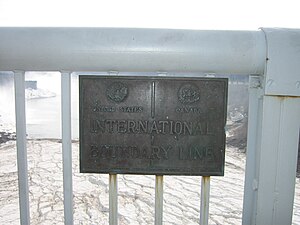
While Canada's policies on criminal record are really strict (any convictions no matter how minor or how long ago makes you inadmissible), it is possible to overcome the inadmissibility by submitting an application for "rehabilitation". This process can take a long time and requires numerous references to prove that you are in fact rehabilitated and that further offences are unlikely. If you do not want to wait that long and must go to Canada, you may be able to apply for a temporary resident permit; however, the reason must be justified and vacations are not considered a justified reason.
If you have been convicted of driving while impaired by alcohol or drugs, you will probably be found criminally inadmissible to Canada as this is an offence under Canada's Criminal Code.
Frequently Asked Questions for criminal inadmissibility to Canada
Character concerns [ edit ]
All potential visitors, whether applying for a temporary resident visa or requesting landing permission at the border must be of good moral character, and under Canadian law this means having a completely clean criminal history. Any offence, misdemeanour or felony, regardless of how minor or how long ago it took place could exclude you from Canada for a period of time or indefinitely. Some U.S. citizens have been turned back while attempting to drive across the border. Even former U.S. President George W. Bush needed to apply for a waiver to enter on an official state visit during his term in office because of a past D.U.I. which happened twenty-four years before that. There are a few exceptions, and if you are inadmissible because of a criminal conviction, you do have some options.
A minor misdemeanour (what Canadian law calls a "summary conviction") may keep you out of Canada for at least five years from the date you finish your sentence. More serious offences ("felonies" in US law, "indictable offences" in Canadian or British law) may require you to wait up to ten years, or in the most serious cases obtain a pardon or other civil relief locally before applying for entry. Some relatively minor infractions in other countries (minor drug possession tickets in countries where they are not handled through the criminal system, or drunk driving in jurisdictions which treat this as a simple traffic violation) are considered criminal convictions for the purpose of immigration law, as Canada's Criminal Code treats these as crimes. With the exception of crimes of conscience, even if you were prosecuted for an offence in that country which would not have been an offence in Canada, it would result in you being inadmissible. Similarly, if you committed a violation that is considered a criminal offence in Canada but not in the country in which it was committed, that would also result in you being inadmissible to Canada. Even if you were never arrested, charged with a crime or sentenced it is possible to be turned away by a border guard on suspicion of criminal activity. Additionally, you cannot enter Canada if there are current charges pending against you or a trial is under way (for obvious reasons).
Although unlikely as a visitor who meets all other entry requirements, you may also be refused if you have significant unpaid debt, have an active civil judgement against you, or have recently declared bankruptcy. This is more likely to be an issue if your nationality requires a visa to enter Canada. In these cases, you can regain your ability to enter Canada by either paying the debt in full, showing evidence of a payment plan in good standing or after a bankruptcy showing a history of financial solvency over the period of a few years.
Offences committed before the age of 18, parking tickets, local ordinance violations and crimes of conscience (such as publishing statements critical of the government in an authoritarian country) generally do not result in inadmissibility. Similarly, non-criminal traffic tickets usually do not result in inadmissibility, although if you were ever required to appear in court over a traffic violation (not simply going to court to challenge a ticket) or you accumulated enough points that your license was summarily suspended or revoked, you may be inadmissible and should contact a Canadian embassy or high counsel for advice.
Rehabilitation [ edit ]
If you have a single misdemeanour or summary offence on your record and it's been at least ten years since you finished your sentence, and your offence could be punishable with a prison term of less than 10 years in Canada, you may be deemed rehabilitated on arrival. Some offences are hybrid, so even some summary offences carry a possible 10-year maximum sentence meaning you cannot be deemed rehabilitated . The burden is on you, the visitor, to provide proof that you have indeed reformed and are unlikely to re-offend. Possible proof includes but is not limited to:
- Police "good conduct" reports
- Character references
- Letters from employers, pay stubs, tax returns or other documentation showing that you have steady employment
- Evidence of any educational, volunteer or treatment experience that you've completed since your conviction.
Bring everything you have that suggests you're living a stable and crime-free life. The more documentation you have and the less the officer has to rely on your word that you've turned your life around the stronger your case is for being admitted.
If you are turned away, or if your offence makes you ineligible to be deemed rehabilitated, you can apply for individual rehabilitation directly to Citizenship and Immigration Canada (CIC) . Again, at least five years must have passed since you completed your sentence. An application for individual rehabilitation has onerous documentation requirements, costs between CAD200 and CAD3,000 depending on the nature of the offence and whether the application requires approval from the Minister of Justice (all except the most straightforward misdemeanour convictions do) and can take six to twelve months (there are no guaranteed processing times) to get an answer. While you can compile the documentation and submit the application yourself, both CIC and many who have gone through the process highly advise retaining an immigration attorney to complete and file the application on your behalf. If you are denied rehabilitation, there is no right of appeal, you will not be given specific reasons as to why your application was denied, and you must wait at least one year before applying again.
Temporary resident permits [ edit ]
If you aren't qualified for either type of rehabilitation or are turned down, another option is a temporary resident permit , a one-time waiver for an inadmissible person to enter Canada. This is not the same as a temporary resident visa , but the two can be applied for together if you are from a country requiring such a visa. These are very rarely granted - only for "exceptionally compelling humanitarian grounds" or "reasons of significant national interest" .
While this has been used or abused by a politically well-connected few (including disgraced Canadian media mogul Conrad Black, who renounced citizenship) issuance of these permits is rare. Unless you're dealing with a documented family emergency, can afford to hire a really good immigration attorney or have connections in Canada (such as a Member of Parliament) who can intervene on your behalf, don't even bother applying for one of these.
Pardons [ edit ]
Obtaining a pardon or unconditional discharge will generally restore your ability to travel to Canada, and depending on your circumstances you may have much more luck going this route. If the crime was committed in Canada, there's a centralized process you can go through and odds of success are fairly high if you've shown commitment to turning your life around and kept your nose clean since then.
If your pardon or discharge was issued for a crime outside Canada, be sure to bring documentation to that effect with you to the border or when applying for a visa.
Financial history [ edit ]
Immigration authorities may perform a credit check and review your overall financial history as part of the character and risk assessment when applying for a visa or for landing permission at the border. Credit checks are not automatic for temporary visitors; they typically occur as part of a larger background investigation that results if the officer cannot ascertain your ability to support yourself. Minor issues (such as an occasional late credit card payment) are not a major concern. That being said, if you have frequent late payments, chargeoffs, liens, repossessions, or a bankruptcy, in the past few years, definitely be prepared to explain yourself (and having recent pay-stubs or other evidence of steady funds available for review is highly advised.)
On the other hand, if you are applying for any type of long term visa (such as a work or study permit) or are immigrating to Canada, your credit will be checked as part of the background investigation, and visas are occasionally denied for recent financial problems or just for having a large amount of unpaid debt, even if it's in good standing (e.g. student loans). Unless you can prove your credit problems were due to circumstances beyond your control (e.g. prolonged disability or illness, failed business venture, or identity theft) or are prepared to hire an immigration attorney, cleaning up your financial state of affairs at home prior to making plans for working or moving to Canada is strongly advised.
If you have a civil judgement against you (whether paid or not), or are a defendant in a pending lawsuit for unpaid debt, depending on the circumstances you may be inadmissible, contact an immigration attorney for advice. Additionally:
- The People's Republic of China and several Persian Gulf countries ( Bahrain , Kuwait , Qatar , and the United Arab Emirates ) treat default as a criminal offence punishable with a jail term.
- In the United States, apart from child support or taxes, default is not a crime. However, in many states evading collection attempts once a debt has progressed to litigation (usually by not showing up for hearings or failing to submit requested documents to the court) can lead to a criminal contempt charge, fines and a jail term.
If either situation applies, you are inadmissible and will need to go through the standard rehabilitation procedure prior to travelling to Canada. In addition to the requisite time requirement, you will also need to show that the debt in question is paid in full or satisfactory arrangements are in place to pay it.
Other concerns [ edit ]
Besides a criminal record, CIC lists a host of other situations that may prevent admission into Canada. While most of these shouldn't be an issue for the average traveller (e.g. previously deported, human rights violations, involvement with terrorism or organized crime), there are a few that do occasionally complicate or bar entry for visitors:
- Business travellers are required by law to present a letter of introduction on corporate letterhead to immigration on arrival. The letter must follow a standardized format specified by CIC and contain a statement of financial support. CBSA is very serious about this requirement and refusals for not having a letter are common.
- If visiting friends or family, you are not officially required to have a letter of introduction, although having something in writing (even an informal e-mail) from your host with their contact information is helpful, should immigration decide to verify your story.
- Tourists should be prepared to provide details about their itinerary - places of interest, hotels that will be stayed in, etc. Having this information (including addresses and phone numbers for hotels) printed out ahead of time is strongly advised.
- All visitors may be asked to show that they have confirmed travel arrangements for departing Canada, as well as "binding ties" to their country of origin or residence (such as a family, job or university studies to return to).
- It's possible to overcome a medical refusal by obtaining an exam from a nominated physician and have them certify that you will not burden the healthcare system. If this applies to you, the immigration officer will give you the required paperwork along with further instructions.
- Obtaining medical insurance that will cover you in Canada, while good advice for all, may especially help in borderline cases.
- For Western tourists, a valid major credit card (not a debit, ATM, or bank card - which may not even work in Canada) usually satisfies this requirement.
- If you do not have a credit card, a recent bank statement or pay-stub is also acceptable.
- have health, financial, or credit problems - your admissibility is unaffected.
- have a criminal record - you may be found inadmissible, although in practice this almost never happens unless your relative's crime made national news headlines.
- are a human rights violator or a known member of an organized crime, terrorist, or hate group - you're inadmissible, call a lawyer.
As a general rule, admissibility and rehabilitation decisions cannot be appealed beyond a supervisory review at the visa office or border. The only exception is if you can prove the decision was based on wrong information (for example you were acquitted of a crime, but that fact was never properly recorded.) That being said, you are usually allowed to apply again once any specific issues relating to a refusal have been corrected, once the requisite time has passed for rehabilitation, or one year after being denied rehabilitation.
Exception for British Citizens [ edit ]
Citizens of the United Kingdom who have convictions considered "spent" under the 1974 Rehabilitation of Offenders Act do not have to apply for "rehabilitation", as they are automatically pardoned under the 1991 Federal Court of Appeals case [dead link] Canada (Minister of Employment and Immigration) v. Burgon, [1991] due to the similarity of the two countries' legal systems. Guidance issued to border officers in the ENF14 /OP 19 Criminal Rehabilitation Manual specifies: "the UK Rehabilitation of Offenders Act automatically pardons eligible individuals without the person having to apply [for Rehabilitation], if the person has been sentenced to a term of imprisonment of less than 30 months" . However, some exceptions to this rule have been witnessed.
Chile [ edit ]
No questions related to criminal history in the visa application .
Cuba [ edit ]
Nationals of a few countries get in visa-free, but almost everyone else can enter on a tourist card [dead link] (effectively a simple visa) where you're asked about little more than your name, birth date and passport data.
Dominican Republic [ edit ]
A considerable number of nationalities including virtually all first world and Western Hemisphere countries can get in visa free (purchase of tourist card is needed). Visa applications [dead link] have no questions related to criminal history.
Mexico [ edit ]
There aren't any questions about a criminal record in the Mexican visa application , nor in the FMM (arrival card).
If your passport reveals a criminal record when scanned, however, you may be denied entrance to the country.
Peru [ edit ]
In general, visitors from the Americas, Europe, Oceania and some Asian countries get in without a visa. On the migration card there aren't any questions related to criminal history, neither is there on the visa form .
United States [ edit ]
The United States of America is generally very strict with criminal records, no matter how minor or how long ago it has been. They do not have any concept of "spent" or "pardoned" convictions, meaning you must truthfully answer any questions about criminal convictions even if your convictions have been spent or pardoned in your country. For citizens of any country who are eligible for the Visa Waiver Program, being convicted of any crimes, having proceedings pending, or even a previously refused visa makes you ineligible for the visa waiver program! Similarly, Canadian and Bermudian citizens, who ordinarily do not require visas to enter the United States, may be refused entry on the grounds of previous criminal convictions.
There are numerous crimes that render you ineligible to enter the US. The two main categories are:
- crimes involving moral turpitude, and
- aggravated felonies.
There is only a loose definition of crimes involving moral turpitude, but generally, it includes crimes that make a person seem untrustworthy, such as fraud or rape, rather than "honest" crimes, like getting into a fistfight. The actual penalty for the conviction does not matter. If you declare a crime involving moral turpitude, then you will probably be deemed 'permanently ineligible to enter the USA'. It is possible to apply for a waiver of permanent ineligibility after a period of time.
Being convicted of an aggravated felony is even worse, though just like crimes involving moral turpitude, these also have a loose definition, therefore the offenses can change over time. This used to include murder and smuggling drugs or guns, and has since been expanded to include things like bribery, human trafficking, and kidnapping people for ransom. There is absolutely no relief, and anyone deported or excluded for this reason cannot enter the U.S. until all court-ordered punishment has been completed and an additional 15 years have elapsed.
Consular staff will interview you to determine the seriousness of your offense and evaluate evidence of rehabilitation. Once granted a waiver, you can obtain a visa (usually one year at first). As a holder of a waiver you can expect long delays in secondary processing at the U.S. border, even with a visa in your passport.
An exception to this is "purely political offenses." Since the U.S. has freedom of speech to criticize the government, people from other parts of the world are given a pass on this type of conviction. However, you must report all crimes on the visa forms, and note anything that wouldn't be a crime in the U.S.
Do not attempt to enter the US if you have been previously deported without a proper visa! Doing so is a felony under US law (8 U.S. Code § 1326), and is punishable by up to 2 years in prison, or, in certain circumstances, 20. Do not lie about your convictions when questioned, as chances are they will find out. The US conducts extensive security checks on all visa applicants.
Visa Office Advisory Opinions [ edit ]
US immigration law is extremely complex, and consular officials often issue decisions without time to fully consult the technical issues of a case , before pushing applicants to pursue a waiver. Although officials benefit from the "sovereignty" of not having their finding of the facts legally questioned, if you are denied a visa it is possible to seek a legal review of the decision if you believe the consular official misapplied the law. You or your attorney may request the US Visa Office in Washington study the case and issue an Advisory Opinion [dead link] on the inadmissibility finding. The results of the opinion are binding on the embassy or consulate receiving the advice, and are often shorter (6-8 weeks) than the waiver process (6-18 months) which may not be relevant.
Asia [ edit ]
Cambodia [ edit ].
Visitors from outside Southeast Asia will need a visa, though for almost everyone this is available on arrival. On the visa form there are no questions related to criminal history.
China [ edit ]
Article 21 of the Exit and Entry Administration Law of the People’s Republic of China denies Chinese visas to many kinds of aliens, and Article 25 of the same law bars many kinds of aliens from China, including those "(m)ay endanger China’s national security or interests, or disrupt social and public order, or engage in other illegal or criminal activities". Those who may be affected should consult the nearest Chinese consular offices before travelling.
Entry may also be denied even if the traveller is not prosecuted. This is the case when some Hong Kong travellers who were arrested for public order offences during the protests but not charged in court were denied entry and have their Home Return Permit revoked.
Transit passengers of many countries are allowed a few days in major cities, but other than that almost everyone needs a visa to enter China. In the visa form , you're asked about a criminal record in China or any other country, and you need to give details if you reply yes.
For a work visa, you will need to provide a criminal record check. A certificate from your local (e.g. county-level) jurisdiction will probably be sufficient, but will need to be notarized and apostilled; see Working in China for more.
Hong Kong [ edit ]
Unlike China, few nationalities need more than a passport and a filled in arrival card to get into Hong Kong, where you just need to fill in personal and passport data and where you will stay. Also the visa application has no questions on previous crimes.
There are also no provisions regarding criminal history in the Immigration Ordinance , though it seems that immigration officials have the sole discretion of approving or denying inbound travellers.
India [ edit ]
Virtually everyone needs a visa to enter India, to be applied for electronically. contains questions about previous crimes [dead link] .
Indonesia [ edit ]
Few nationalities need a visa to visit Indonesia, and the arrival card has reportedly been abolished too, so most visitors apparently don't need to declare anything about your past in writing.
Iran [ edit ]
Any arrests or convictions need to be declared and explained when applying for an Iranian visa .
Israel [ edit ]
Nationals of countries in the Americas, Europe and Oceania and a few others can enter visa-free. In the visa form you need to declare that you haven't committed any criminal offence.
Japan [ edit ]
Article 5(1)(iv) of the Immigration Control and Refugee Recognition Act [dead link] prohibits any person who have been sentenced to imprisonment or imprisonment without work for 1 year or more, except for political crimes.
In the Japanese visa application there are several questions related to a criminal history; convictions of a crime in the first place, sentences to imprisonment of a year or more, deportation, drug offenses, prostitution and trafficking of people, in any country. If you can enter with just a passport, you will need to fill in a disembarkation card (like when arriving in many other countries) and there too you need to declare previous convictions.
Macau [ edit ]
Similar to next door Hong Kong, most visitor need a passport and a simple arrival card with things like name, passport number and address in Macau.
However, according to Law 16/2021 , non-local residents who have been sentenced to imprisonment in or outside Macau may be denied entry to Macau.
Malaysia [ edit ]
Having being sentenced to any jail term is one of the things that will get you labeled as a "prohibited person" per section 8 of the Immigration Act 1959/63 . Nevertheless, visitors are not asked about this in the visa application [dead link] , and most nationalities don't need a visa anyway. Disembarkation cards have been abolished.
Nepal [ edit ]
People of almost all nationalities need a visa, but can get it on arrival or online, no crime-related questions asked in the form [dead link] .
Philippines [ edit ]
Most nationalities can get enter the Philippines without a visa. Like most arrival cards, the Philippine doesn't have questions about criminal convictions, neither does the visa form .
However, section 29 of the Philippine Immigration Act prohibits "persons who have been convicted of a crime involving moral turpitude" from entering the Philippines.
Singapore [ edit ]
Like Hong Kong, almost everyone can get in without a visa. The Disembarkation/Embarkation Card visitors need to fill in doesn't have any questions about previous crimes.
However, section 8(3)(d) of the Immigration Act 1959 lists those that have been removed or convicted for a sentence of imprisonment as potential undesirable immigrants, and entry may be refused.
South Korea [ edit ]
Unlike China and Japan, the visa application includes no questions about criminal history. A considerable number of nationalities get in with just a passport and the arrival card doesn't have any such questions.
Taiwan [ edit ]
Article 18 of the Immigration Act allows the government of the Republic of China to bar aliens from Taiwan for not only criminal history anywhere but also for many other reasons, like serious diseases or the risk of endangering national interests, public security, public order. Please consult the nearest Taiwanese consular offices before travel. Trying to enter Taiwan with visa exemption or landing visas may result in being refused entry and asked to apply for advanced visa before reentering Taiwan, or even banned from Taiwan in the worst cases. Even if already admitted into Taiwan, being found indeed inadmissible risks deportation per Article 36 of the Immigration Act .
Thailand [ edit ]
Per the Immigration Act of Thailand B.E. 2522 (1979) , any jail term except for a petty offence, negligence or something excepted by Ministerial Regulations will disqualify you from entry. You don't have to declare this on the visa application form nor on the TM.6 arrival card .
United Arab Emirates [ edit ]
In the UAE visa application you need to declare your profession, and the biggest issue seems to be people coming in to work without a job permit. On the other hand, there aren't questions regarding crimes.
Vietnam [ edit ]
Generally a visa is needed to enter, but some Western European and most nearby countries can get in visa free. No questions about previous crimes in the visa form, except for business visas. .
Europe [ edit ]
Schengen area [ edit ].
The rules for the European Union , specifically the Schengen Area , regarding character concerns are relatively lax. Questions about criminal convictions are not asked when applying for a Schengen visitor/business visa and border agents (there are no landing cards for data entry) usually don't ask any questions about this either.
If any officials or forms ask you if you have a criminal history you still have to answer truthfully but, in general, if it's not more than 3 years of imprisonment, or crimes involving alien smuggling or drug offences that resulted in more than 2 years of imprisonment, then they will not refuse you entry or a visa on those grounds. Countries like Germany do have specific rules that state anyone convicted of an offence relating to public order with a sentence of more than 3 years, a drug offence with a sentence of more than 2 years, and any offence related to alien smuggling are subject to deportation. Like the UK, they are more concerned with offences committed in their country, rather than outside of the EU. Do not lie in any visa application or when answering questions to officials, because in Germany this lie will mean you can then be deported. Not all countries have the same rule regarding character concerns, so some EU countries may be more lax, however Germany is known to be a rather strict country so it is a good guideline on rules for the EU.
In Schengen visa applications , there doesn't seem to be a question about any criminal past. Nevertheless, this might come up in a visa interview, and the ETIAS [dead link] system which is going to be implemented early 2021 for visa-free visitors to the Schengen area (similar to for example the American ESTA) reportedly will include background checks with questions related to criminal records, deportations and such by Frontex .
Ireland [ edit ]
Citizens of most countries in Europe and the Americas and a few countries elsewhere in the Eastern Hemisphere can get in visa free. No crime-related questions in the visa form .
Russia [ edit ]
The shorter variant of the Russian visa application form [dead link] is applicable to most nationalities who need a visa, and there applicants are just asked about their planned trip, current employer and relatives in Russia. The more extensive form [dead link] is for UK, US, Canadian, Australian and Georgian citizens and there applicants have to report former arrests and convictions among others. According to the visa form replying in affirmative to such questions don't automatically mean you don't get a visa but you may have to go to the consulate for an interview.
Turkey [ edit ]
On the Turkish visa form there are no questions about criminal history, other than having being deported from Turkey. People that are deemed to pose a public order, security or health risk can be refused entry. [dead link]
Ukraine [ edit ]
Nationals of most first world countries (but not Australia and New Zealand), countries from the former CIS and some Latin American countries are allowed in visa-free, the rest need to apply for a visa (e-visa for most Latin American and many Asian countries). The visa form [dead link] doesn't include crime-related questions.
United Kingdom [ edit ]

Character requirements for the United Kingdom are considerably stricter than that of the Schengen area.
The United Kingdom has a concept of "spent" convictions - this act has recently been updated so check these: application forms [dead link] . Immigration officers wishing to exclude or remove someone on the basis of a criminal conviction must prove that the offence is not spent and therefore the person is not rehabilitated. A conviction is "spent" if more than 10 years has passed since imprisonment (if any) between 6 and 30 months. Any imprisonment over 30 months cannot ever be spent and therefore will always count against you. Imprisonment of less than 6 months or fines have an even shorter rehabilitation period (around 5 years or less).
The immigration officer wishing to deport you, or refuse entry on the basis of criminal conviction must prove that your convictions have not been "spent". The burden of proof is on them, not you, so if you were refused entry due to a criminal conviction chances are your offence is not spent. If the offence is spent, then you don't even have to tell them about it and they cannot use it against you even if they do know. For consecutive prison sentences the rehabilitation period would begin at the time you were last in prison, unless the sentence is over 30 months.
Oceania [ edit ]
Australia and new zealand [ edit ].
These countries are rather strict regarding character concerns but Australia specifically says "in the last 10 years" on entry literature since Commonwealth of Australia legislation specifically regards as "spent" [dead link] convictions that are more than 10 years old (you also should not have been sentenced to imprisonment for more than 30 months and you've not re-offended (even in a minor way) during the 10 year (5 years for juvenile offenders) waiting period and a statutory or regulatory exclusion does not apply. For an Australian work visa, you'll need to get a background check from every country you've lived in for 12 months or more during the past ten years.
While New Zealand does have a clean slate scheme, immigration is specifically excluded from the scheme. That means when applying for a visa or entering New Zealand, you must declare your full criminal record including all spent convictions. Character issues [dead link] can bar you from entering New Zealand. These include having ever being sentenced to a jail term of 5 years or more, or for 12 months or more during the last 10 years. You'll also be refused entry if you've been deported from any country or are deemed likely to commit crimes or otherwise pose a risk if you're let in.
There are already other concerns that are just as strict such as being deported from any country (New Zealand), health concerns like being HIV positive or even having cancer or diabetes, that can result in a visa being denied, entry refusal or deportation.
While citizens of Australia and New Zealand are generally free to travel to each other's countries and stay indefinitely with full-time employment rights, entry may still be denied on the basis of previous criminal convictions.
See also [ edit ]
- Border crossing
- Visa trouble
- Has custom banner
- Articles with dead external links
- Topic articles
- Usable topics
- Usable articles
Navigation menu
Travel to Australia with a criminal record

If you have a criminal record, you may be concerned about your Australia visa application.
Having a criminal record does not automatically prevent you from travelling** to Australia. However, your criminal history will be assessed as part of your visa application.
This article provides a detailed explanation of how a criminal record may impact your Australia visa decision.
Can I get an Australian visa online with a criminal record?
To be issued a visa for Australia, you must meet the good character requirement . If your criminal record means you do not meet this requirement, you might not be able to get a visa.
You may still pass the requirement and be issued a visa if you committed a minor offence and are not considered a threat.
Australia ETA and eVisitor applications if you have a criminal record
You cannot get an online eVisitor or ETA if you have prison sentences totalling 12 months or more .
You will need to apply for a different type of visa and supply additional documents to travel to Australia.
Understanding Australia's character requirement
You must meet the character requirements for Australia. It ensures the visa applications of people with a criminal record or those who present a threat are evaluated thoroughly.
Australia places great importance on maintaining a safe environment for residents and visitors .
Australia character requirement legislative background
The character requirement is based on the Migration Act 1958, Section 501. This outlines the character test that all visa applicants must satisfy.
The character test assesses past conduct, including any criminal history, to determine whether you can get a visa.
What criminal records prevent travel to Australia?
A substantial criminal record may prevent you from travelling to Australia. You are considered to hold a substantial criminal record if you have been:
- Sentenced to prison for 12 months or more
- Sentenced to 2 or more prison terms for a total of 12 months or more
There are some other situations in which your criminal record could be considered serious.
In these cases, you’ll need to provide additional documentation to support your visa application.
Offences of specific concern for Australia visa applications
Some types of offences are of particular concern and will likely prevent you from meeting the character requirement. These include violent crimes, sexual offences, and drug trafficking.
Australian authorities will evaluate whether you pose a threat to the public when assessing your application.
Association with criminal individuals or groups
Ties to criminal organizations or individuals involved in criminal activities may also affect your chances of obtaining an Australian visa.
The Australian authorities take associations of this nature seriously and consider them a risk factor when assessing visa applications.
How does Australia check for a criminal record?
Australian immigration has a vast network able to obtain information including criminal convictions. All Australia visa applicants need to fill out a character declaration. This will ask about:
- Any criminal convictions
- Past visa cancellations or refusals
Honesty is crucial . Providing false information can lead to visa refusal or cancellation, and even bans on future applications.
Documentation to show good character for visa applications
Home Affairs seeks facts and documentation to show people have not acted in this way, and are not likely to re-offend. Applicants must meet all character requirements . Psychiatrist assessment may be required and/or professional references, should there be any issues.
Please note that this page does not include the complete list of character requirements as defined in subsection 6 of Section 501 of Australia’s Migration Act 1958 .
A migration agent should be able to assist and assess the matter in more detail if you reasonably believe there are potential issues or concerns with not meeting the character requirements.
Applicants may also be asked to supply supporting documentation to verify their character, including a police certificate (penal clearance certificate) from every country in which they lived and a letter from an employer to verify good conduct. This may include information about reports from psychologists or professional medically qualified personnel, a character statutory declaration, and/or form 80 – Personal particulars for character assessment.
Those who have served in any military force are required to provide a military certificate proving no criminal offence was committed during the time served.
If the applicant has no substantial criminal record and a report of good behaviour in general, then the e-visa for Australia may be granted.
Applying for a character waiver for Australia
If you do not meet Australia’s character requirements you may be able to apply for a character waiver in exceptional circumstances.
Character waivers are granted only in specific scenarios where the positive aspects of an applicant's character outweigh the concerns raised by their criminal record.
To apply for a character waiver, you need to provide a detailed explanation of your circumstances , including supporting documents such as character references, evidence of rehabilitation, and any other relevant information.
Seeking professional advice is recommended to ensure a comprehensive and well-prepared application.
How to enter Australia with a criminal record
If you have a criminal record, you can still apply for a visa, ETA, or eVisitor. If you do not meet the requirements, you’ll be notified and advised of the steps you need to take.
Depending on the nature of your criminal record, this might be applying for a different type of visa or providing supporting documents.
Advice for applying for an Australian visa if you have a criminal record
Here is some advice for applying for an Australian visa if you have a criminal record:
- Be upfront about any criminal offences
- Answer any questions truthfully
- Supply all the information requested
The Australian Immigration Department will take all of the circumstances surrounding an individual case into account. If they find out that you’ve not been honest then it could lead to a potential ban, refusal and/or visa cancellation.
If you have a substantial criminal record you may wish to seek assistance from a migration agent.
Related Posts

Extending a tourist visa for Australia

Being a digital nomad in Australia: visa options and advice

Brisbane: a visitor’s guide to the capital of Queensland
- Travel insurance
- Travel insurance guides
Where can I travel with a criminal record?

A criminal record could jeopardise your chances of working, studying or going on holiday abroad.
The implications vary between countries. But there are lots of popular locations that might not let you get a visa if you have a criminal record. Here’s everything you need to know.
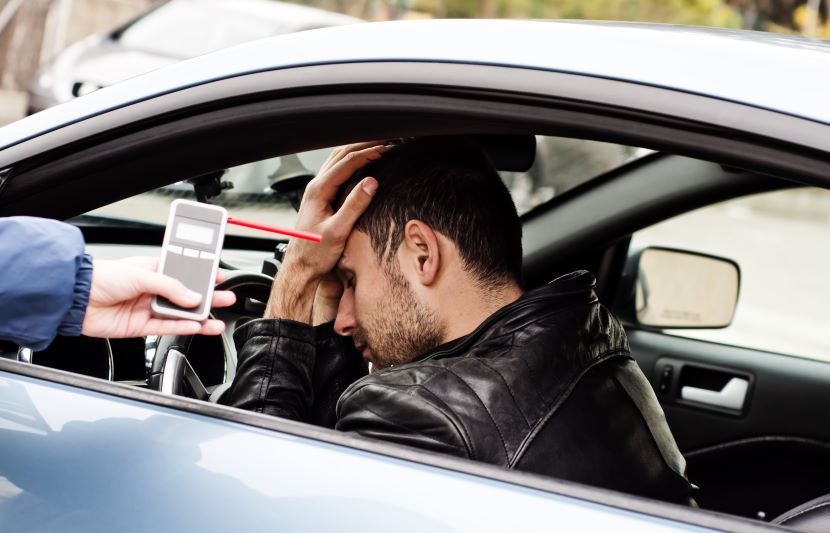
Can you travel abroad with a criminal record?
It’s possible to travel abroad with a criminal record. But you might find there are some countries you’re not allowed to visit.
Typically, if you require a visa to enter the country, you need to disclose if you have a criminal record or conviction. Visa applications are exempt from the Rehabilitation of Offenders Act 1974 so you need to state any spent and unspent convictions.
But, if you're on licence, you need permission to travel outside the UK. This is rarely provided and is often only given in exceptional circumstances.
Can you go to America with a criminal record?
If you don’t declare your convictions, you might be barred from travelling to the United States.
The Rehabilitation of Offenders Act 1974 doesn’t apply to US visa law. Even spent convictions might have an impact on whether you’re allowed to enter the United States.
UK travellers looking to travel to the US can usually apply for an Electronic System for Travel Authorisation (ESTA) rather than a visa. But if you’ve got a conviction or caution on your criminal record, it could prevent you from using the visa waiver scheme.
When applying for a visa, a consular officer should determine your qualifications.
Applicants are required to get an Association of Chief Police Officers Police Certificate issued within 6 months of the date of the visa interview.
Information on getting the police certificate is available from the Association of Chief Police Officers Criminal Records Office website. But, due to Royal Mail issues, they're unable to send any certificates using Royal Mail International Tracked shipping. They say customers should expect significant disruption and allow more time to process their applications.
You’re also required to complete the personal data form VCU1 and provide as much detail as possible concerning your:
You might be able to travel to Australia with a criminal record if you can apply for a full tourist visa.
UK citizens need to get an electronic visitor visa to travel to Australia , either as a tourist or on business. But if you have a criminal conviction that resulted in a prison sentence, you might need to apply for a full tourist visa.
While these are usually granted automatically, there could be delays if you have a criminal record.
In certain cases, your application might be referred to the Australian High Commission – the Australian Embassy in London. If you’ve got a criminal record, you might also have to apply for a police certificate. This could take up to 49 days.
All Australian visa applicants have to satisfy the ‘character test’, which is set out in Section 501 of the Migration Act 1958 . You might not pass the character test if you’ve got a substantial criminal record.
It's unlikely that a conviction for something like a drink-driving offence would prevent you from getting a visa to enter Australia. But it might delay your application.
Can you go to Dubai with a criminal record?
You can enter Dubai and the United Arab Emirates (UAE) with a criminal record. But, the crime must not have been committed in Dubai and you need to have served the entirety of the sentence.
If you have a British passport, you may be able to get a tourist visa when you enter the UAE. But, as the UAE embassies don't issue visas, you need to apply at a UAE-based airline.
If you travel to Dubai with a criminal record and stay for more than 30 days, your criminal record might be checked after this time.
If you plan to stay in Dubai long-term, know you may not be able to get a job with a criminal record. You need to have a background security check and get a certificate of good conduct.
Can you go to Europe with a criminal record?
UK travellers typically don't need a visa to enter the EU short-term. Travellers who don’t need visas usually aren’t asked about criminal records and criminal conviction checks aren’t typically carried out at borders.
But, from November 2023, UK travellers visiting participating EU countries have to get a European Travel Information and Authorization System (ETIAS) waiver.
If you’ve got a criminal record, you should be able to apply for an ETIAS and potentially discuss the circumstances around your conviction. If you’re denied an ETIAS, you might be able to appeal to the country that made the decision.
To apply for an ETIAS, you need:
- A valid passport
- An email address
- A credit or debit card to pay for the application fee
What countries can I travel to with a criminal record?
While you might be able to travel to some countries with the appropriate visa, there are several that don’t ask about criminal convictions at all.
Unlock says that, based on feedback, the following countries either don’t require a visa or don’t ask about criminal convictions on their entry forms:
- The Philippines
But it's important to note that this information is based on leisure and tourism travel. Policies may be different for longer stays or business trips.
Countries you cannot visit with a criminal record
These are the countries you can't travel to if you're convicted of a serious crime, according to VisaGuide.World :
- New Zealand
- South Africa
- The United Kingdom
- United States
Any other country that requires a visa for entry might ask you whether you’ve got a criminal conviction.
For instance, Canada sets out all kinds of criteria to demonstrate an offender has been rehabilitated before they may enter the country.
Russia asks about criminal convictions and you could end up being denied a visa. Unlock says there’s little information on what types of offence would lead to an application being refused. But most visas are approved and people are typically only declined in exceptional cases.
India is another country that asks about criminal records on its e-visitor applications. If you answer yes, you might be asked to provide further details about your conviction and a police certificate with more information. The visa officer should then decide whether to give you a visa.
Always check before you travel
If you’re travelling abroad and worried that your criminal record could result in you being refused entry, check the country’s policy first.
If you need to get a visa or use a visa waiver scheme, make sure you’ve checked to see what you could be asked. Leave yourself plenty of time, as you might need to provide extra information and police reports.
Declare any criminal convictions you may have in your application before travelling, regardless of how minor you think they are.
What happens if I’m refused entry to a country?
You might not be allowed to board a plane if you don’t have the right documentation, including the necessary visas or evidence of Covid vaccination. Sometimes your airline can arrange fast electronic travel authorisation, but this isn’t guaranteed.
You’re unlikely to be denied entry to a country once you’ve arrived at the airport. This is because you should have all your necessary documentation checked before you get on the plane.
In these rare instances, you’re likely to be sent home on the next flight - potentially at your own expense. But exactly what happens depends on the nature of the situation and the airline you're with.
Can I claim on my travel insurance if I’m refused entry to a country?
No. If you’re refused entry to a country, it’s often due to not having the necessary visas to enter.
In this case, travel insurance can’t help because you should make the necessary applications and organise the appropriate documentation beforehand.
Travel insurance covers unforeseen losses. Most insurers believe it's the traveller's responsibility to ensure they have the appropriate documentation and comply with the entry rules of the country.
If you're refused entry, it's likely due to your own error or lack of research - something many travel insurance policies don't cover.
Travel insurance is designed to provide peace of mind while you’re on holiday, both abroad and in the UK. Most policies cover you if:
- Your travel plans are cancelled or delayed
- You or someone you're travelling with falls ill and can’t travel
- Your airline goes bust
- Your items are lost or stolen while on holiday
- You need to pay medical expenses while abroad or in the UK
You may also be covered for any pre-existing medical conditions, though this depends on your insurer and specific policy.
Compare travel insurance
Share this article
Car insurance articles.

Drivers 'ripped off' as government tackles unfair price hikes by fuel retailers
New regulations are coming in for fuel retailers as an investigation revealed that they were charging 6p more per litre than they should have been.

Noise cameras and reporting loud cars
Noise cameras aim to crack down on drivers who have noisy cars.

Temporary car insurance statistics: 2023
Uncover 2023 UK statistics on temporary car insurance. Explore usage patterns, customer satisfaction, and top providers for short-term car coverage needs.

Drink-driving: Over 16,000 arrests in summer alone
Drink-driving increases over the summer months. We look at the worst offending areas and why people might be risking an extra pint before driving.

Car insurance statistics: 2023
With the UK car insurance industry increasing in size each year, we share all you need to know about the competitive car insurance providers and policies

The most hated driving habits and what you can do about them
Tailgating and unclear indicating are the most hated driving habits according to our data. Here's what you can do about these annoying driving traits.
cookie usage
We use cookies, some of which are essential to make our website work. For us to use our non-essential cookies, we need your consent. You can consent by accepting all or alternatively, manage your cookies at any time. For more information, read our cookie policy .
Non-essential cookies allow us to enhance your customer experience through testing and personalisation. They also allow us to present you with tailored advertising on social media.

Information for reportable offenders
Frequently asked questions, i am a reportable offender. can i travel overseas, i'm not an australian citizen. am i affected, i'm on a register, but i wasn't convicted of a child sex offence. am i affected, i have an australian passport. will it be cancelled can i still use it, how do i know if a competent authority has asked dfat to deny me a passport, a competent authority has decided i can keep my passport. am i free to travel, if i go to the airport to travel, and my passport is still valid, what will happen, i'm an australian dual national and i have a foreign passport. can i use it, how do i get permission to travel, how do i find out who my competent authority is, i have permission to travel. do i need a new passport, how do i get permission to apply for a new passport, how do i apply for a passport, what if the competent authority doesn't tell dfat, how far in advance should i seek permission to travel, how long will it take me to get a passport, what if it's an emergency, can i apply for a passport in anticipation of getting permission to travel, can i use my new passport before my permission to travel commences, for how long will my passport be valid, will overseas authorities be advised of my international travel, should i declare my status as a reportable offender when applying for a visa, i've finished my overseas travel but my passport is still valid. can i use it again, i'm overseas. what will happen to me, i was overseas when these measures commenced. have i broken the law, what happens when my reporting responsibilities end, when did these measures commence.
- are an Australian citizen; and
- are entered on a State or Territory child protection register; and
- have current reporting obligations
it is an offence for you to travel overseas without permission from a competent authority. This offence is punishable by imprisonment for 5 years and/or 300 penalty units.
Additionally, if a competent authority requests the Minister for Foreign Affairs to cancel your passport, refuse to issue you a passport, or demand the surrender of a foreign passport you possess, then the Department of Foreign Affairs and Trade (DFAT) will arrange those actions.
For these purposes, a competent authority is any person who has responsibility for, or powers, functions or duties in relation to, a child protection register under a law of the Commonwealth, a State or a Territory.
No. These measures only apply to Australian citizens.
Yes. A small number of people on child protection registers have been included for reasons other than a child sex offence. If you are one of them, these measures apply to you. Like others, you may seek permission from a competent authority to travel overseas.
If a competent authority requests that your passport be cancelled, DFAT will arrange this. DFAT will then write to you care of the competent authority to tell you that your passport has been cancelled. In the meantime, it is an offence for you to attempt to depart Australia without permission, even if you still have a valid passport.
If you want to confirm whether a request has been made, you will need to ask the competent authority responsible for your reporting obligations.
It is an offence to attempt to depart Australia without permission, even if a competent authority decides not to request that your passport be cancelled.
It is a Commonwealth offence for you to attempt to depart Australia without permission, even if you still have a valid passport. If you make any such attempt, your passport may be seized, and you may be detained and prosecuted.
If a competent authority makes a request to DFAT, you will be ordered to surrender your foreign passport. Even if you are not ordered to surrender your foreign passport, it will be a Commonwealth offence for you to attempt to use it to depart Australia without permission.
By approaching the relevant competent authority in your State or Territory. Be aware that competent authorities will only grant permission in exceptional circumstances.
Do not contact DFAT to request permission to travel. Only competent authorities can grant such permission. DFAT acts on the basis of those decisions. It has no authority of its own to grant permission for you to leave Australia.
Contact the officer or authority to whom you report as part of your reporting obligations.
If you have permission to travel, and if your passport has not been cancelled, then you do not need a new passport.
If your passport has been cancelled, it cannot be reactivated. If you try to use a cancelled passport, it will be impounded at the border and you will not be able to travel. You will need to apply for a new passport. You will not be entitled to any waiver or reduction of the usual application fee.
You can check if your passport is still valid, and ensure it has not been cancelled without your knowing, by phoning 131 232. You will not need to identify yourself as a reportable offender.
If a competent authority gives you permission to travel, it will record this in your entry in the Australian National Child Offender Register (ANCOR). Specialised staff in DFAT will see this and will process any passport application accordingly. You do not need any separate or additional permission to obtain a passport.
If you have permission to travel, you should apply for a passport in the usual way. When submitting your application, you do not need to identify yourself as a reportable offender to Australian Post or passport office staff. You do not need to submit any documentation as evidence of your permission to travel – the only evidence DFAT will act on is an updated ANCOR entry.
If you apply for a passport, but a competent authority hasn't told DFAT that you have permission to travel, DFAT will write to you at the address in your application to tell you so. DFAT will not contact the competent authority on your behalf. It will be up to you to arrange with the competent authority for it to advise DFAT via ANCOR, within 28 days from the date on the letter from DFAT, that you have permission to travel. If it does not do this, your passport application will be administratively withdrawn after the 28-day period. You will not be entitled to a refund of your application fee.
You should allow plenty of time. To allow for any visa applications you may need to make, DFAT will issue a passport up to three months prior to the date on which your permitted travel commences.
If a competent authority has advised DFAT via ANCOR that you have permission to travel, and if the commencement date of that travel is no more than three months in the future, then your passport application will be processed in line with DFAT's usual service standards.
If the commencement date for your permitted travel is more than three months in the future, DFAT will hold your application until the three month period commences. If you have applied for priority service, you will not be refunded the priority service fee.
If you need to travel urgently, and you have permission from a competent authority, you can apply for priority processing of your passport application in the usual way. If all the other conditions for a passport are satisfied, DFAT will issue a passport within two business days of receiving everything we need from you. This does not take into account transit times for applications lodged at Australia Post or for passports delivered by mail.
Yes, but if a competent authority does not, within 28 days after you submit your application, provide DFAT with advice via ANCOR that you have permission to travel, then your passport application will be administratively withdrawn, and you will not be refunded the application fee.
No. You will have to wait until the period covered by your travel permission commences. It is a Commonwealth offence for you to attempt to depart Australia without permission, even if you have a valid passport.
Your passport will be valid until the end of the period when you are permitted to travel, plus an additional six months to take account of the requirement of many countries that all visitor passports be valid for at least six months from when the visitor intends to leave that country.
In accordance with its role and function, the Australian Federal Police (AFP) will notify relevant overseas law enforcement authorities of your proposed and actual travel.
Overseas law enforcement authorities may take action in accordance with their own laws and policies. This may result in refusal or denial of entry to that country. The AFP, DFAT and other government agencies accept no responsibility for any such action which may occur, or any financial loss which may result, from any refusal or denial of entry to any country.
Foreign countries have a range of different entry arrangements, including visa-free, visa-waiver and electronic visa programs. You should enquire with the Embassy or Consulate of your intended destination about its requirements, and how your status as a reportable offender affects your eligibility for entry. Failing to declare information when required by a law of a foreign country may be an offence in that country and may result in criminal prosecution, denial of a visa, or denial of entry.
Only if you still have permission to travel. It is a Commonwealth offence for you to attempt to depart Australia without permission, even if you have a valid passport.
If a competent authority requests that your passport be cancelled, then DFAT will arrange this, regardless of your location. DFAT will then write to you care of the competent authority to let you know that your passport has been cancelled.
If you want to confirm whether a request has been made, you will need to ask the competent authority responsible for your reporting obligations. If you are unsure of your passport's current status, you can check it by phoning 131 232. You will not need to identify yourself as a reportable offender.
If you are overseas, and your passport has been cancelled, and you need a new travel document to return to Australia, you should apply for a passport or travel document at an Australian Embassy, High Commission or Consulate in the usual way. You will receive a limited-validity document valid for one-way travel to Australia. It will be impounded at the border when you arrive in Australia. You do not need any permission from a competent authority in order to receive this travel document.
No. If you left Australia before the measures commenced then you have not broken the law.
When your reporting responsibilities end, it will no longer be an offence for you to attempt to depart Australia without permission.
If your passport was not cancelled, then you do not need a new passport.
If your passport was cancelled, you cannot use it again. Whenever any Australian passport is cancelled, it cannot be reactivated. If you try to use a cancelled passport, it will be impounded at the border and you will not be able to travel. You will need to apply for a new passport in the usual way. You will not be entitled to any waiver or reduction of the usual application fee.
13 December 2017.

- Media and resources
Language English
Criminal record
Written confirmation needed to enter australia.
New Zealand citizens planning to travel, live, or work in Australia, who have criminal convictions, must get written confirmation that they will be allowed to enter Australia from the Australian Department of Home Affairs before traveling. You may also be required to apply for a specific visa.
It doesn’t matter how long ago your convictions were, or whether they have been removed from government records – you still need written confirmation.
Find out how to do this and get more information on travelling to Australia with a criminal conviction (external link) . .
If convicted of a crime in Australia
If a New Zealander is convicted of a crime while living in Australia, or Australian authorities assess that a New Zealander is not meeting the relevant character requirements, their visa can be cancelled and they can be deported.
- Share on Facebook
- Share on Twitter
- Share on LinkedIn
We use cookies and other tracking technologies to improve your browsing experience on our website, to analyze our website traffic, and to understand where our visitors are coming from. You can find out more information on our Privacy Page .
- Australia edition
- International edition
- Europe edition

Man charged with domestic murder of Forbes woman Molly Ticehurst was on bail for other offences
Queenslander Daniel Billings was on bail for earlier charges including stalking and cruelty before arrest for alleged murder, NSW court hears
- Follow our Australia news live blog for latest updates
- Get our morning and afternoon news emails , free app or daily news podcast
A man accused of murdering his ex-girlfriend in regional New South Wales while on bail for rape and stalking charges against her will remain behind bars.
Daniel Billings has been charged with the domestic violence murder of Molly Ticehurst, 28, whose body was found in a Forbes homes in the early hours of Monday.
Investigations led police to a property 100km away, in Fifield, where Billings was arrested.
The 29-year-old, from Dalby in Queensland, was charged with murder and breaching an apprehended violence order and failing to comply with bail conditions.
During a brief mention in Orange local court on Tuesday morning, Billings did not apply for bail and it was refused by magistrate David Day.
Sign up for Guardian Australia’s free morning and afternoon email newsletters for your daily news roundup
Day also revoked Billings’ bail regarding the earlier charges, including three counts of sexual intercourse without consent and four counts of stalking and intimidating Ticehurst in recent months.
The earlier charges further included two counts of recklessly destroying a car window and a pedestal fan at her house and aggravated animal cruelty against her 12-week-old dachshund puppy.
Billings had not entered pleas that were due on those charges, the court heard. “That’s not good enough,” Day said on Tuesday.
Billings remained in custody at Parkes police station and did not appear in court.
Before the court appearance, Det Insp Jason Darcy said Billings and Ticehurst had been in a relationship.
Darcy described the killing as “brutal”, adding it had left Ticehurst’s family devastated. “Naturally, they’re just distraught,” he told reporters on Monday.
Ticehurst was a childcare worker in Forbes.
The NSW premier, Chris Minns, said: “We need to understand what happened, the immediate run-up to this alleged crime and that’s exactly what we’re doing this morning.”
Billings was scheduled to next appear in Parkes local court on 20 June.
- New South Wales
- Domestic violence
- Crime - Australia
Most viewed
Numbers, Facts and Trends Shaping Your World
Read our research on:
Full Topic List
Regions & Countries
- Publications
- Our Methods
- Short Reads
- Tools & Resources
Read Our Research On:
What the data says about crime in the U.S.
A growing share of Americans say reducing crime should be a top priority for the president and Congress to address this year. Around six-in-ten U.S. adults (58%) hold that view today, up from 47% at the beginning of Joe Biden’s presidency in 2021.
We conducted this analysis to learn more about U.S. crime patterns and how those patterns have changed over time.
The analysis relies on statistics published by the FBI, which we accessed through the Crime Data Explorer , and the Bureau of Justice Statistics (BJS), which we accessed through the National Crime Victimization Survey data analysis tool .
To measure public attitudes about crime in the U.S., we relied on survey data from Pew Research Center and Gallup.
Additional details about each data source, including survey methodologies, are available by following the links in the text of this analysis.
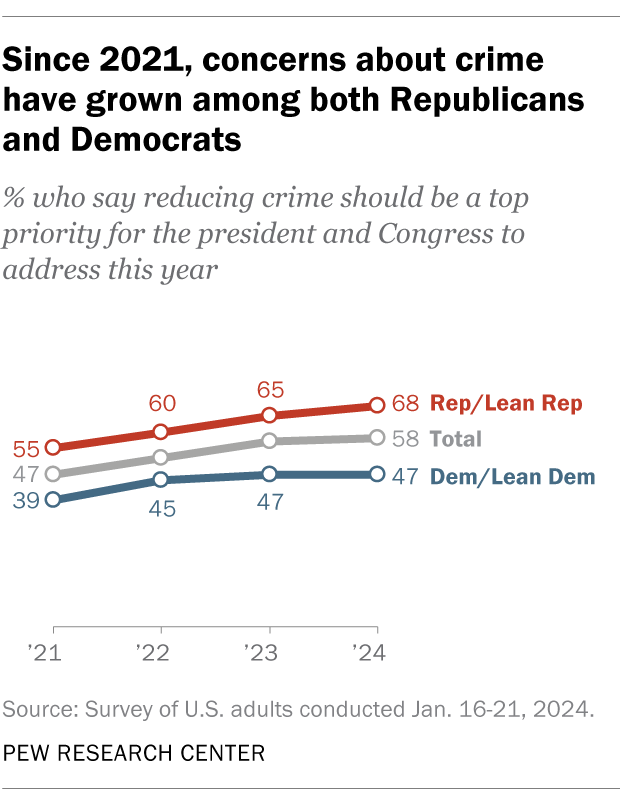
With the issue likely to come up in this year’s presidential election, here’s what we know about crime in the United States, based on the latest available data from the federal government and other sources.
How much crime is there in the U.S.?
It’s difficult to say for certain. The two primary sources of government crime statistics – the Federal Bureau of Investigation (FBI) and the Bureau of Justice Statistics (BJS) – paint an incomplete picture.
The FBI publishes annual data on crimes that have been reported to law enforcement, but not crimes that haven’t been reported. Historically, the FBI has also only published statistics about a handful of specific violent and property crimes, but not many other types of crime, such as drug crime. And while the FBI’s data is based on information from thousands of federal, state, county, city and other police departments, not all law enforcement agencies participate every year. In 2022, the most recent full year with available statistics, the FBI received data from 83% of participating agencies .
BJS, for its part, tracks crime by fielding a large annual survey of Americans ages 12 and older and asking them whether they were the victim of certain types of crime in the past six months. One advantage of this approach is that it captures both reported and unreported crimes. But the BJS survey has limitations of its own. Like the FBI, it focuses mainly on a handful of violent and property crimes. And since the BJS data is based on after-the-fact interviews with crime victims, it cannot provide information about one especially high-profile type of offense: murder.
All those caveats aside, looking at the FBI and BJS statistics side-by-side does give researchers a good picture of U.S. violent and property crime rates and how they have changed over time. In addition, the FBI is transitioning to a new data collection system – known as the National Incident-Based Reporting System – that eventually will provide national information on a much larger set of crimes , as well as details such as the time and place they occur and the types of weapons involved, if applicable.
Which kinds of crime are most and least common?
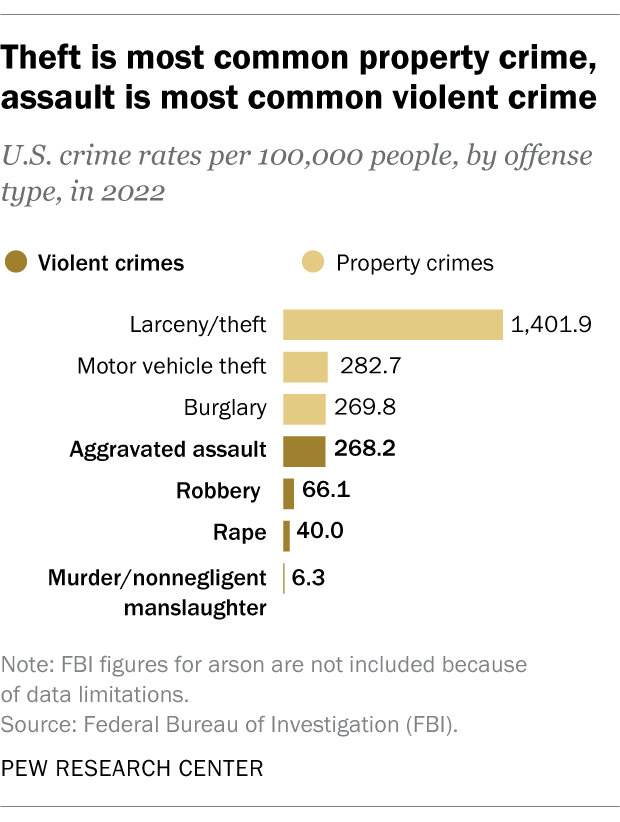
Property crime in the U.S. is much more common than violent crime. In 2022, the FBI reported a total of 1,954.4 property crimes per 100,000 people, compared with 380.7 violent crimes per 100,000 people.
By far the most common form of property crime in 2022 was larceny/theft, followed by motor vehicle theft and burglary. Among violent crimes, aggravated assault was the most common offense, followed by robbery, rape, and murder/nonnegligent manslaughter.
BJS tracks a slightly different set of offenses from the FBI, but it finds the same overall patterns, with theft the most common form of property crime in 2022 and assault the most common form of violent crime.
How have crime rates in the U.S. changed over time?
Both the FBI and BJS data show dramatic declines in U.S. violent and property crime rates since the early 1990s, when crime spiked across much of the nation.
Using the FBI data, the violent crime rate fell 49% between 1993 and 2022, with large decreases in the rates of robbery (-74%), aggravated assault (-39%) and murder/nonnegligent manslaughter (-34%). It’s not possible to calculate the change in the rape rate during this period because the FBI revised its definition of the offense in 2013 .
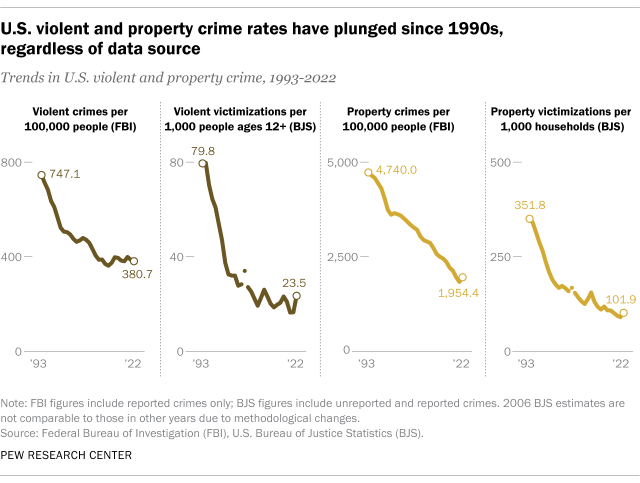
The FBI data also shows a 59% reduction in the U.S. property crime rate between 1993 and 2022, with big declines in the rates of burglary (-75%), larceny/theft (-54%) and motor vehicle theft (-53%).
Using the BJS statistics, the declines in the violent and property crime rates are even steeper than those captured in the FBI data. Per BJS, the U.S. violent and property crime rates each fell 71% between 1993 and 2022.
While crime rates have fallen sharply over the long term, the decline hasn’t always been steady. There have been notable increases in certain kinds of crime in some years, including recently.
In 2020, for example, the U.S. murder rate saw its largest single-year increase on record – and by 2022, it remained considerably higher than before the coronavirus pandemic. Preliminary data for 2023, however, suggests that the murder rate fell substantially last year .
How do Americans perceive crime in their country?
Americans tend to believe crime is up, even when official data shows it is down.
In 23 of 27 Gallup surveys conducted since 1993 , at least 60% of U.S. adults have said there is more crime nationally than there was the year before, despite the downward trend in crime rates during most of that period.
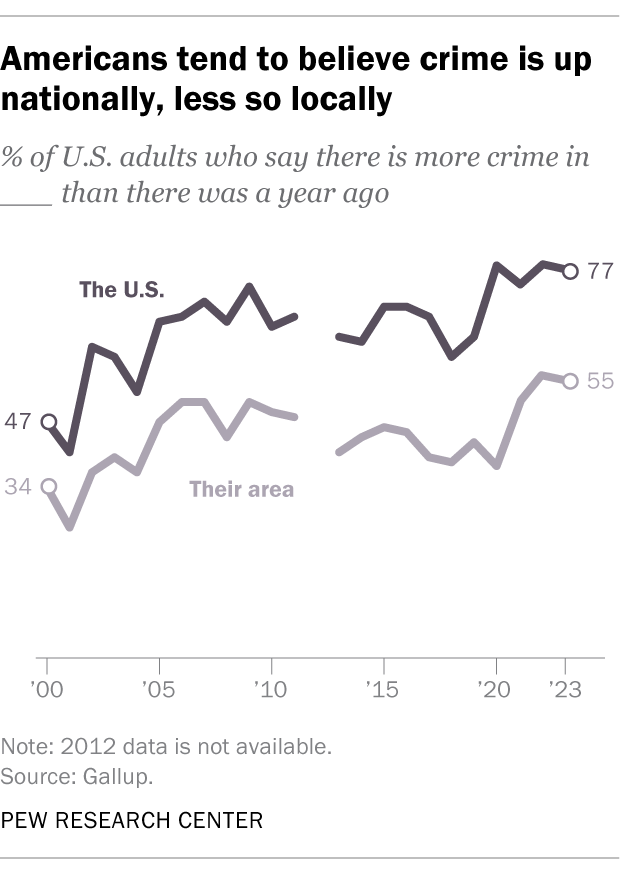
While perceptions of rising crime at the national level are common, fewer Americans believe crime is up in their own communities. In every Gallup crime survey since the 1990s, Americans have been much less likely to say crime is up in their area than to say the same about crime nationally.
Public attitudes about crime differ widely by Americans’ party affiliation, race and ethnicity, and other factors . For example, Republicans and Republican-leaning independents are much more likely than Democrats and Democratic leaners to say reducing crime should be a top priority for the president and Congress this year (68% vs. 47%), according to a recent Pew Research Center survey.
How does crime in the U.S. differ by demographic characteristics?
Some groups of Americans are more likely than others to be victims of crime. In the 2022 BJS survey , for example, younger people and those with lower incomes were far more likely to report being the victim of a violent crime than older and higher-income people.
There were no major differences in violent crime victimization rates between male and female respondents or between those who identified as White, Black or Hispanic. But the victimization rate among Asian Americans (a category that includes Native Hawaiians and other Pacific Islanders) was substantially lower than among other racial and ethnic groups.
The same BJS survey asks victims about the demographic characteristics of the offenders in the incidents they experienced.
In 2022, those who are male, younger people and those who are Black accounted for considerably larger shares of perceived offenders in violent incidents than their respective shares of the U.S. population. Men, for instance, accounted for 79% of perceived offenders in violent incidents, compared with 49% of the nation’s 12-and-older population that year. Black Americans accounted for 25% of perceived offenders in violent incidents, about twice their share of the 12-and-older population (12%).
As with all surveys, however, there are several potential sources of error, including the possibility that crime victims’ perceptions about offenders are incorrect.
How does crime in the U.S. differ geographically?
There are big geographic differences in violent and property crime rates.
For example, in 2022, there were more than 700 violent crimes per 100,000 residents in New Mexico and Alaska. That compares with fewer than 200 per 100,000 people in Rhode Island, Connecticut, New Hampshire and Maine, according to the FBI.
The FBI notes that various factors might influence an area’s crime rate, including its population density and economic conditions.
What percentage of crimes are reported to police? What percentage are solved?
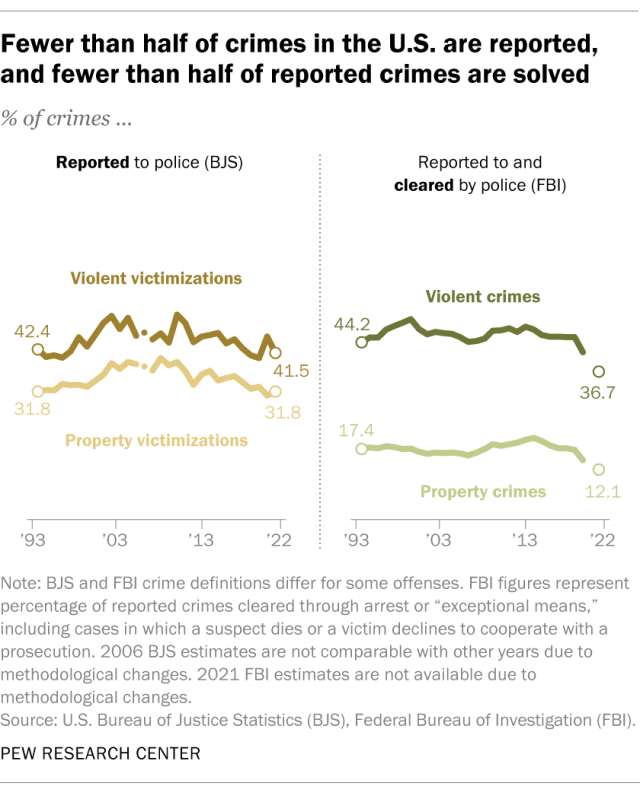
Most violent and property crimes in the U.S. are not reported to police, and most of the crimes that are reported are not solved.
In its annual survey, BJS asks crime victims whether they reported their crime to police. It found that in 2022, only 41.5% of violent crimes and 31.8% of household property crimes were reported to authorities. BJS notes that there are many reasons why crime might not be reported, including fear of reprisal or of “getting the offender in trouble,” a feeling that police “would not or could not do anything to help,” or a belief that the crime is “a personal issue or too trivial to report.”
Most of the crimes that are reported to police, meanwhile, are not solved , at least based on an FBI measure known as the clearance rate . That’s the share of cases each year that are closed, or “cleared,” through the arrest, charging and referral of a suspect for prosecution, or due to “exceptional” circumstances such as the death of a suspect or a victim’s refusal to cooperate with a prosecution. In 2022, police nationwide cleared 36.7% of violent crimes that were reported to them and 12.1% of the property crimes that came to their attention.
Which crimes are most likely to be reported to police? Which are most likely to be solved?
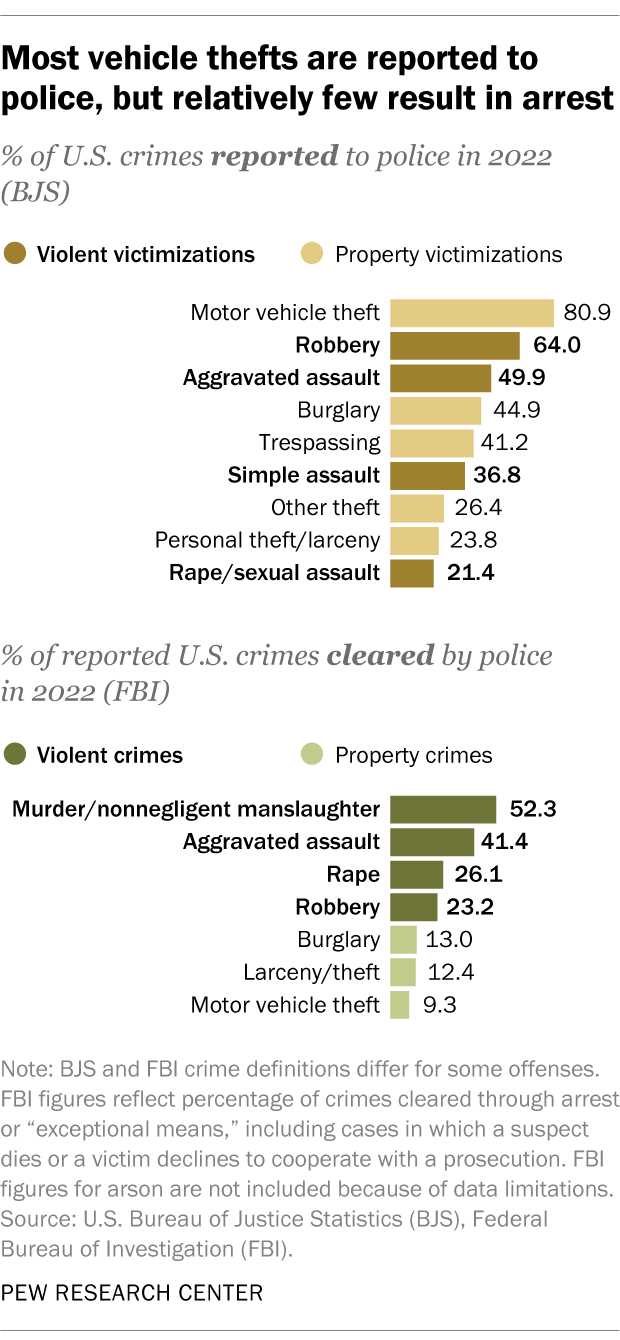
Around eight-in-ten motor vehicle thefts (80.9%) were reported to police in 2022, making them by far the most commonly reported property crime tracked by BJS. Household burglaries and trespassing offenses were reported to police at much lower rates (44.9% and 41.2%, respectively), while personal theft/larceny and other types of theft were only reported around a quarter of the time.
Among violent crimes – excluding homicide, which BJS doesn’t track – robbery was the most likely to be reported to law enforcement in 2022 (64.0%). It was followed by aggravated assault (49.9%), simple assault (36.8%) and rape/sexual assault (21.4%).
The list of crimes cleared by police in 2022 looks different from the list of crimes reported. Law enforcement officers were generally much more likely to solve violent crimes than property crimes, according to the FBI.
The most frequently solved violent crime tends to be homicide. Police cleared around half of murders and nonnegligent manslaughters (52.3%) in 2022. The clearance rates were lower for aggravated assault (41.4%), rape (26.1%) and robbery (23.2%).
When it comes to property crime, law enforcement agencies cleared 13.0% of burglaries, 12.4% of larcenies/thefts and 9.3% of motor vehicle thefts in 2022.
Are police solving more or fewer crimes than they used to?
Nationwide clearance rates for both violent and property crime are at their lowest levels since at least 1993, the FBI data shows.
Police cleared a little over a third (36.7%) of the violent crimes that came to their attention in 2022, down from nearly half (48.1%) as recently as 2013. During the same period, there were decreases for each of the four types of violent crime the FBI tracks:
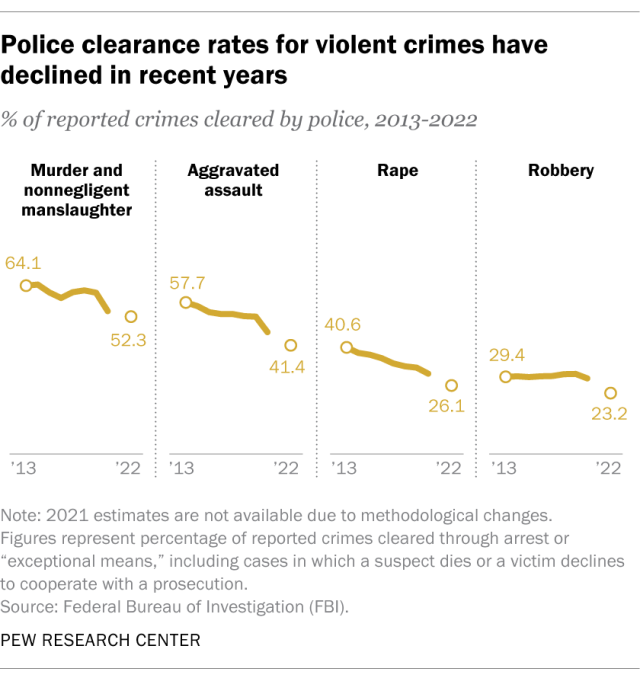
- Police cleared 52.3% of reported murders and nonnegligent homicides in 2022, down from 64.1% in 2013.
- They cleared 41.4% of aggravated assaults, down from 57.7%.
- They cleared 26.1% of rapes, down from 40.6%.
- They cleared 23.2% of robberies, down from 29.4%.
The pattern is less pronounced for property crime. Overall, law enforcement agencies cleared 12.1% of reported property crimes in 2022, down from 19.7% in 2013. The clearance rate for burglary didn’t change much, but it fell for larceny/theft (to 12.4% in 2022 from 22.4% in 2013) and motor vehicle theft (to 9.3% from 14.2%).
Note: This is an update of a post originally published on Nov. 20, 2020.
- Criminal Justice

John Gramlich is an associate director at Pew Research Center
8 facts about Black Lives Matter
#blacklivesmatter turns 10, support for the black lives matter movement has dropped considerably from its peak in 2020, fewer than 1% of federal criminal defendants were acquitted in 2022, before release of video showing tyre nichols’ beating, public views of police conduct had improved modestly, most popular.
1615 L St. NW, Suite 800 Washington, DC 20036 USA (+1) 202-419-4300 | Main (+1) 202-857-8562 | Fax (+1) 202-419-4372 | Media Inquiries
Research Topics
- Age & Generations
- Coronavirus (COVID-19)
- Economy & Work
- Family & Relationships
- Gender & LGBTQ
- Immigration & Migration
- International Affairs
- Internet & Technology
- Methodological Research
- News Habits & Media
- Non-U.S. Governments
- Other Topics
- Politics & Policy
- Race & Ethnicity
- Email Newsletters
ABOUT PEW RESEARCH CENTER Pew Research Center is a nonpartisan fact tank that informs the public about the issues, attitudes and trends shaping the world. It conducts public opinion polling, demographic research, media content analysis and other empirical social science research. Pew Research Center does not take policy positions. It is a subsidiary of The Pew Charitable Trusts .
Copyright 2024 Pew Research Center
Terms & Conditions
Privacy Policy
Cookie Settings
Reprints, Permissions & Use Policy

IMAGES
VIDEO
COMMENTS
Yes, travellers with a criminal record may apply for the Australian ETA or an eVisitor Visa. A person convicted of a minor offence, who has not been sentenced to prison, can complete the ETA or eVisitor application form. A traveller with a substantial criminal record, may not apply for the ETA for Australia or the eVisitor visa.
You can apply for an Australian visa if you have a criminal record. The key factor is to look into your criminal record to ensure that you pass the character test. This involves determining if you have a substantial criminal record. If you have any criminal offences or a criminal record, it would be best to contact an experienced immigration ...
New Zealand passport holders can travel to Australia without a visa and obtain a visa on arrival at the airport. ... Enter Australia with a criminal record. As part of your application for a temporary or permanent visa, we will check for any criminal records. You may need to provide a police clearance from your country and your other countries ...
Australia ETA: Criminal Convictions (eVisitor Visa) Individuals who wish to travel to Australia - with a criminal record - will not be able to apply for an Australia ETA (eVisitor) visa, which completed online. If you have criminal convictions, with a prison sentence totalling 12 months or more (whether served or suspended), you will fail ...
Character requirements for visas. You must be of good character to visit or live in Australia. This means you must meet the character requirements, and remain of good character. The character requirements are set out under section 501 of the Migration Act 1958. They help us decide if you are of good character.
Yes, a criminal record can affect an Australian's travel abroad. Entry policies of the destination country determine the impact. Some nations require criminal background statements, while others restrict visas or entrance to those with specified crimes. Australians with criminal backgrounds should investigate their destination's entrance ...
We cannot tell you in advance what may or may not be on your NPC. You'll need to check with the criminal records section of the relevant state or territory police service. Fees and charges. Each NPC application costs $47. If you need to supply fingerprints as part of your application, the total cost is $104. Application fees are exempt from GST.
What type of visa do I need to travel to Australia with a criminal record? The type of visa you need will depend on various factors, including the nature of your offense. Consult with an immigration lawyer or registered migration agent to determine the most suitable visa subclass for your circumstances. 3. Will my criminal record affect my ...
An Electronic Travel Authority (ETA) An ETA Tourist Visa allows you to stay in Australia for up to 3 months on each arrival within 12 months from the date the visa was granted. Although there is no visa application charge, a service fee of $20 applies. An example of this is the Australian Visa Bureau but other services are available.
Obtaining a visa for Australia sounds very simple and, in most cases, it is, unless you have a criminal record. Foreigners with a criminal record need to apply for a full tourist visa from the Australian Home Affairs. The conditions state very clearly that you can hope to get such a visa only if you don't have a substantial criminal record.
All types of tourist visas for Australia require full disclosure of your criminal record. According to Australian law, people with a 'substantial criminal record' will be automatically denied entry. This term, 'substantial criminal record', refers to the length of the sentences dictated by a criminal court in your country of origin or ...
The criminal conviction was: a non-violent misdemeanor from 17 years ago. 2 years probation; no jail time; I called Home Affairs and they said they could not advise. At this point I leave for Australia in a few days. I don't have time to do the other visa process.
In addition to this a criminal record can have long-term consequences, including potential impact on employment opportunities, travel overseas, and other aspects of an persons life. In Australia, criminal records are subject to strict privacy and security regulations to protect the confidentiality and integrity of the information contained in them.
The bottom line is that a US felon can travel to Australia if they prepare accordingly. Your criminal history is up for a checkup during the application process. Either an ETA or eTraveler visa will do. A felon will need to truthfully fill out either one of those forms and wait 2 (two) days for the final decision.
Inside the world heritage listed former Fremantle prison. 200 years ago many British criminals were sent to Australia; nowadays having a criminal history is an ... In general it is very difficult, if not impossible, to travel to any country if you have a record of convictions for violent or sexual crimes, repeated convictions for felonies, or a ...
Requesting travel records. Requesting travel records. You can ask for a record of your specific dates of travel in and out of Australia (movement records) after 1981. See how to apply. Note: For movements before January 1981, you will need to contact the National Archives of Australia. They will not show the countries you travelled to or from.
A substantial criminal record may prevent you from travelling to Australia. You are considered to hold a substantial criminal record if you have been: Sentenced to prison for 12 months or more. Sentenced to 2 or more prison terms for a total of 12 months or more. There are some other situations in which your criminal record could be considered ...
You might be able to travel to Australia with a criminal record if you can apply for a full tourist visa. UK citizens need to get an electronic visitor visa to travel to Australia, either as a tourist or on business. But if you have a criminal conviction that resulted in a prison sentence, you might need to apply for a full tourist visa.
If you want to confirm whether a request has been made, you will need to ask the competent authority responsible for your reporting obligations. If you are unsure of your passport's current status, you can check it by phoning 131 232. You will not need to identify yourself as a reportable offender.
I applied for the eVisitor visa 2 days ago, with only 8 weeks to go until my flight. Believing that honesty is the best policy, I answered "yes" to the criminal conviction question. When I was 15 years old (17 years ago), I was reprimanded for affray, which wasn't an actual conviction that went to court but more like a caution or warning.
Use this form if you are a New Zealand passport holder with criminal convictions, seeking to travel to Australia. This form will provide guidance on whether you may be considered a "behaviour concern non-citizen", which impacts your eligibility for a Special Category (subclass 444) visa (SCV). Note that the decision whether to grant a SCV ...
Written confirmation needed to enter Australia. New Zealand citizens planning to travel, live, or work in Australia, who have criminal convictions, must get written confirmation that they will be allowed to enter Australia from the Australian Department of Home Affairs before traveling. You may also be required to apply for a specific visa.
Having a criminal record makes international travel very difficult. Because most countries try to protect their citizens from outside criminal activities, they have strict laws about who can enter a particular country and who cannot. As a result, if you have a criminal record, you won't be allowed to enter most countries where you're required […]
Planned surgery wait times longest on record, medical association says. 3d ago. ... which was supposed to be the first step toward overhauling and digitising Australia's travel and visa system ...
The earlier charges further included two counts of recklessly destroying a car window and a pedestal fan at her house and aggravated animal cruelty against her 12-week-old dachshund puppy.
In 2020, for example, the U.S. murder rate saw its largest single-year increase on record - and by 2022, it remained considerably higher than before the coronavirus pandemic. Preliminary data for 2023, however, suggests that the murder rate fell substantially last year .